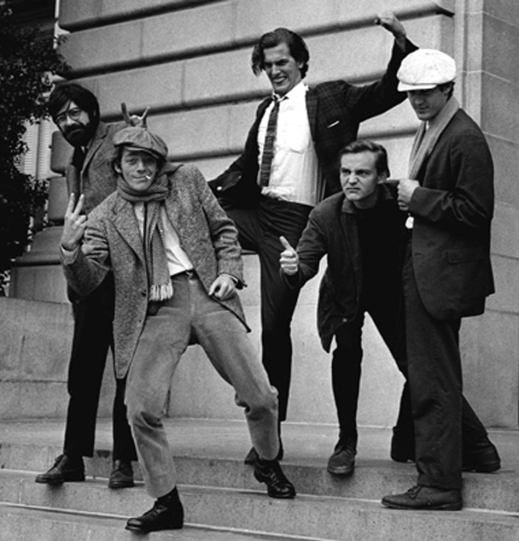
The San Francisco Diggers were meant to be loose, free and vaguely anonymous — or pseudonymous — but perhaps inevitably, some people’s names got out. Usually they were the ones who spoke to a reporter.
And there were a lot of reporters in the Haight-Ashbury during the Diggers’ heyday of 1966-8. Such was the Diggers’ presence and notoriety that seemingly every reporter filing a story on the Haight — even, memorably, a typically dyspeptic Joan Didion, for the Saturday Evening Post—included the Diggers in their account.
“A band of hippie do-gooders,” said Time magazine. “A true peace corps,” wrote local daily newspaper columnist (and future Rolling Stone editor) Ralph J. Gleason. “A cross between the Mad Bomber and Johnny Appleseed,” said future Yippie Paul Krassner in The Realist, “a combination of Lenny Bruce and Malcolm X, the illegitimate offspring resulting from the seduction of Mary Worth by an acidic anarchist.” Didion wrote, “In the official District mythology, [the Diggers] are supposed to be a group of anonymous good guys with no thought in their collective head but to lend a helping hand.”
Who were these guys? Actor Peter Coyote and the late Emmett Grogan are the usual names associated with the Diggers (and their later incarnation, sometimes called the Free Family collective), as they wrote books chronicling their participation in that era; Grogan’s Ringolevio (1972) is the most notorious. But there were many others who participated in the various wildly audacious Digger initiatives of the time.
Kent Minault’s involvement in the Diggers wasn’t a secret. He and four other Diggers, including Grogan, were identified by name in a photograph that ran on the front page of the San Francisco Chronicle in 1966 — well, kind of, as Kent gave his first name as Pierre to the Chronicle. Later, Kent appeared in Ringolevio as “Slim Minnaux,” and was featured heavily in Coyote’s 1998 memoir, Sleeping Where I Fall. When David Hollander and I interviewed Kent at his Los Angeles home in 2006 for a documentary film, it was the first time he had spoken on the record about his time with the Diggers. He had a lot to say — and, as a veteran stage actor, a wonderfully theatrical way of saying it. Details, color, context, insight: it’s all here in Kent’s vivid storytelling.
The following text is a combination of that initial 2006 interview and a follow-up interview I conducted with Kent and fellow Digger Harvey Kornspan in May, 2011. It has not been edited down for a general audience, and many incidents and personages are spoken of without context, or only in passing. There are, inevitably, a few digressions. My advice to the casual-but-curious reader is to simply let these unfamiliar/unexplained bits pass. Keep reading, there’s a good chance you’ll like the next part. (For more about the Diggers, consult the vast archive that has been maintained for decades by historian Eric Noble at diggers.org)
This presentation has been prepared in extensive consultation with Kent. Any errors of transcript are mine, and notice of any corrections of fact would be greatly appreciated.
Please note that in 2017, Kent presented a fantastic one-man performance, “Diggerly Do’s,” in San Francisco, detailing the early months of his Diggers experience. His script drew from the transcripts of our conversations. You can see a video of one of the performances here.
This is the third in a series of interviews with Diggers that I am presenting online for the first time. The others were Phyllis Willner and Chuck Gould. More to come.
If you would like to support my work, please donate via PayPal. All donations, regardless of size, are greatly appreciated. Thank you!
— Jay Babcock (babcock.jay@gmail.com), Feb. 26, 2020
Read more: “We’re gonna do economic activity—without money!”: Inside the criminal glamour of the San Francisco Diggers with Kent Minault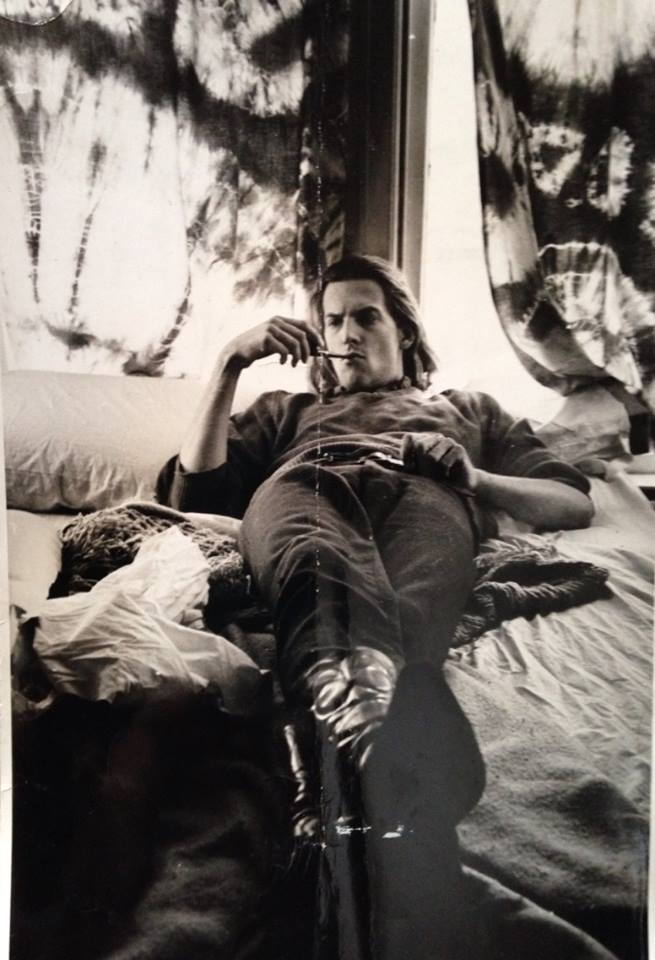
Kent Minault: I’m an old man. [laughing] My memory may be destroying things. We must acknowledge this at the outset. Because I read the stuff that other people have written and things that they say in the interviews and I go, I’m not sure I remember it that way.
Jay Babcock: How did you become involved with the Diggers?
I came to San Francisco in ’65. I had been an actor in the Colorado Shakespeare Festival. There were two rides, one going back east and one going out west. And I said, Ah, I’ll take the one going west. And so I ended up in Berkeley. I knew that there was a sofa, or a floor at least, that I could sleep on in Berkeley. I stayed in Berkeley for a while and I got a job as a traffic surveyor, cuz they needed to figure out where to build the BART. So it was kind of a pork barrel job, but the money wasn’t bad and I did that and I cast about because I knew I wanted to be an actor but I had no idea how to do it. So I got into some bad plays in San Francisco and was disgruntled and thrown out of the companies.
Then I was working on a paper for my college degree, which was belated, and I was typing away in this little cottage that I subsequently rented and there came a knock on the door. And this guy was there who I’d been in a little singing group with in college. I hadn’t seen him in years. He said, I heard you were in town. Listen we need some actors over at the San Francisco Mime Troupe. Do you think you’d have time? And I had seen the Mime Troupe a couple of nights before and I thought they were just amazing. They were intimidating to me—I thought I would never be good enough to be in a company like that.
So I went over and I did my Shakespeare monologue, my Biff Loman, and [SF Mime Troupe director] Ronnie Davis sat there, squinting at me, with the smoke from his last quarter inch Camel cigarette, and he looked at me and thought about me for a minute, and then he said, Okay, stick around. And he went back in the office for coffee. I had no idea what I was supposed to do. There were people hanging around, playing guitars, smoking and talking to each other, so I wandered around and got to meet people. It turned out that you could do stuff there on a Monday night, do little workshops. So I was a Mime Troupe actor, and within a year I was in the Minstrel Show.
So that was kind of my conservatory. But it was out of that that the Diggers really started. The Diggers was originally a performance of a kind. It was a piece of theater.
What was intimidating about what the Mime Troupe was doing?
Well, its physicality. They could sing, they could dance, they could act, they were funny. They created these amazing pictures. It was sharper and more disciplined then any theater I’d ever seen before. And y’know, I was sort of the big actor on campus in my college days, but when I saw that, all of that meant nothing because the skill level was really high. They were really good.
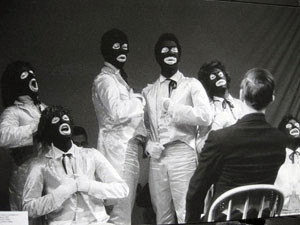

Who was the friend who knocked on your cottage door?
Ken Whiterow was his name. He was a stage manager at that time. I think he quickly left and began doing something else. And as I got involved with the Mime Troupe, I was in correspondence with my college buddy Brooks Bucher—he and I had been roommates in the University of Rochester. When I came out and got involved in the Mime Troupe, I had been passing letters back and forth with him. And he came west later on. And he sort of took over what Ken Whiterow had been doing, started doing stage managing and stuff at the Mime Troupe. He was never interested in being an actor.
Brooks and I had an odd relationship. He was my best friend, really, for quite a few years. But we had a relationship whereby we could dare each other to do things. And when we were in the university together, we dared each other to go to Europe, to work our way to Europe. We couldn’t get a ticket—which was fine, because we really didn’t have the money anyway. We had to get a job on a boat. So, in the middle of my senior year, we left the university, we went to New York City, we slept on a friend’s floor, we walked around to boats and just asked them if we could work on the boat and go to Europe. And people just laughed at us. They thought that was the stupidest thing in the world. Nobody did that. Maybe 20, 40 years ago they did it, but not now. But we persisted and someone said, You know so long as you’re talking to American or English boats, it is indeed a waste of time. But try the Scandinavians and the Italians. So we narrowed down our search a little bit and indeed after three weeks we found a job on a Norwegian freighter, and we went to Europe. So we did the thing.
And so our relationship was characterized by those things. While we were in New York doing that, he said, Let’s climb to the top of the Brooklyn Bridge—at midnight. And if you go to the Brooklyn Bridge, those cables go right up to those towers, and they have two little cables along the side so you can actually walk right up those. So we went at midnight and walked up to the Brooklyn Bridge, said Okay, let’s go, and we walked up to the top and took a few photographs to prove that we’d done it. That was the kind of thing we did.
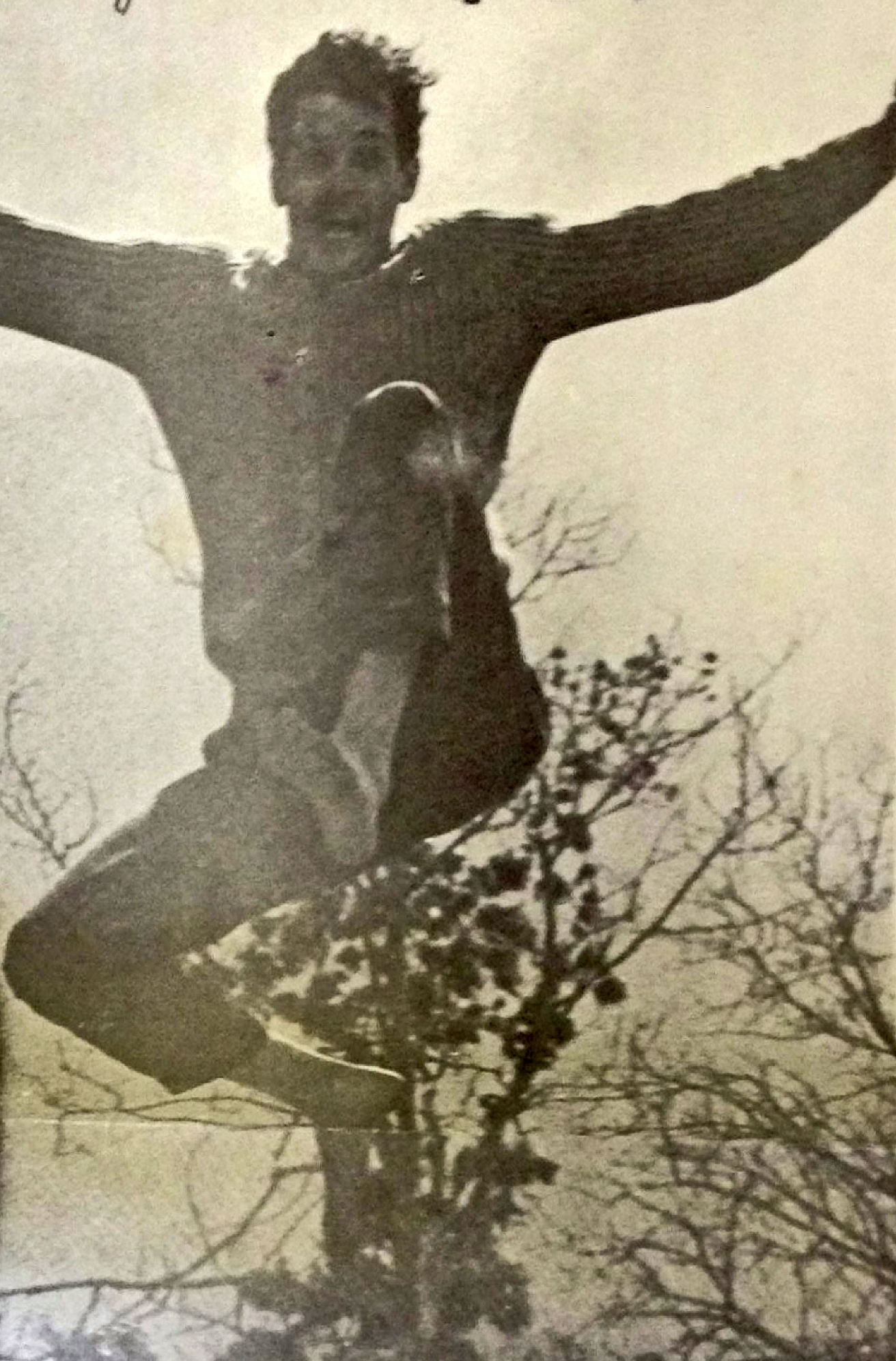
So then when I was involved in the Mime Troupe, he came out, because this was clearly the thing to do. It was my little moment to lead the relationship, and dare him to get involved with this radical theater company. So he came out, and you know, had no acting experience, and wasn’t really interested in being an actor, but he could do lots of other things.
Let me give you a little background on Brooks. He came from a little town in New York called Painted Post, a little rural New York state town. I think he had been adopted because his father Jerry was actually his stepfather. He was the kind of guy who would wear broad lapel checked blazers and loud ties and things like that and shake your hand real firmly. I only met him a couple times. Brooks in college… I thought Brooks was just the coolest guy, because he had a great walk. His shoulders were utterly relaxed. He was a great looking man. And he was on the football team. He had football shoulders, a football build. He was on the Rochester football team, played a little bit. He also had a real uncanny sense of how to hustle something well. He got ROTC to pay for his education for three years and then dropped out. And somehow, they were appalled at him, at his lack of patriotism, and he just paid for the last year of his education on his own, and so got three years of free education. Totally pissed off ROTC but at least at that time there was nothing they could do about it. He didn’t see any reason why one shouldn’t do that, [because] they would pay for his education and then immediately consign him to DEATH. So he figured if they’re gonna play me that way, I’m gonna play them. So he thought that way.
He had that “special light that shone on him” quality, where you can do things like that and he was perfectly happy with it. Though some people might find it morally questionable, he never would. He had women climbing in his dormitory window at night, stuff like that. He was very attractive to women.
I think his romantic interest at the time flamed out and then he came out west. I assured him that there was plenty of romance and adventure in San Francisco. When I came to San Francisco in ‘65, I happened to move into the Haight-Ashbury, but it wasn’t because there was anything about the Haight-Ashbury, it was just a place where you could get a cheap room. The “Haight-Ashbury” had not started yet. But, by the time he came out a year later, it had. I think it was early ‘66 or something, we got this place together over in Noe Valley.
Brooks was no actor, and didn’t want to be an actor, but he thought the Mime Troupe was pretty interesting. So he became a stage manager, in charge of props and moving stuff around and when the truck would go to the park, he would be there with it, and so on. Brooks was a smart guy but I think he was really there for the adventure, he was just looking for a way to be a part of it all. Brooks and [the Mime Troupe’s] Emmett [Grogan] were just the kind of people who would get along with each other. They both had that cocky confidence. They had a similar walk and everything—it was like a relaxed swagger.
The Diggers began because this young black guy was killed by the police, and the next day, Emmett had done something where he’d gotten free food out there [in the park]. Because Emmett could speak a little Italian, and all the produce wholesalers were these old Italian guys. Unless they were Chinese. In any case, he went down there and got free food out of them, and that’s how it started. Now, Peter Coyote and I and a lot of the other people who became involved with the Diggers weren’t around at that time because we were on tour with the Mime Troupe. The Mime Troupe had gotten a lot of attention and some of us had got arrested. I remember when we came back to the airport, it was like the big media heroes. When we got off the airplane, news crews came up and shoved microphones in our faces. And we were being interviewed and everything like that.
And I remember Brooks is standing off to the side, looking around impatiently, waiting for us to be done. He was there to pick me up cuz we had a place together up on Noe Street. He took me back to the place. I said, Touring is exhausting man, I’m just gonna sleep for a week. He said, Well no, not exactly. You can’t. You’ve gotta go get the free food. And I said, What free food? He said, For the Diggers. And I said, What’s the Diggers? And he said, you’ll find out. But you gotta get up at 5:30 in the morning. I said no man, I’m not getting up at 5:30 in the morning, I’ve been getting three hours of sleep a night for the past two months, I can’t do that. He said, Just this once, then you can go back to sleep. And because of our characteristic relationship, he sort of had some right to insist. So I go Oh, okay. So he said, Here’s the keys to the yellow Volkswagen box. Brooks had bought this yellow Volkswagen bus—well, it wasn’t a bus, because it didn’t have the windows, it was like a panel van. A big tin box. It was a yellow box on wheels. It was like a camper van but it had no windows, so it wasn’t a camper. This was called the “Yellow Excess.” And a lot of our early adventures happened in this Volkswagen bus. I remember we spraypainted on the side, ‘The road of excess leads to the palace of wisdom.’ Anyways, it didn’t have the quote from Blake painted on it yet but probably would within a few weeks of this. So he said, Here’s the keys. Now you gotta get up at 5:30, so set your alarm clock.
My room just had a pallet on the floor, and an orange crate for the night table. And it was cold—it’s San Francisco, right? So the thing rang, 5:30, I got up, and I said, Now what am I doing? How do I get the free food? He said, Go to the produce market. I said, Well where is that. He said, It’s down on Army Street. I said, Well do you have an address? He said, Don’t worry, just go down Army Street, you’ll see. It’s 5:30 in the morning and I was disoriented and confused, and he just shoved the keys into my hand and pushed me out the door.
It was still dark. I staggered down, started up the bus, which slowly coughed into life, and I drove down the hill, and I found Army Street, and I went along Army Street, towards the 101 freeway. And sure enough pretty soon there was a sign, one of those green marker signs, that says San Francisco Produce Terminal and it’s got an arrow, and you had to follow the arrow and then there’s a U-turn and then you go around and pretty soon I’m in this new area I’d never been in before. I come out into this large open area and there’s a parking lot in the middle, and these big industrial tin siding buildings down two sides, and it’s the San Francisco Produce Terminal. It’s got a big sign there in the middle, and I’m unmistakably there.
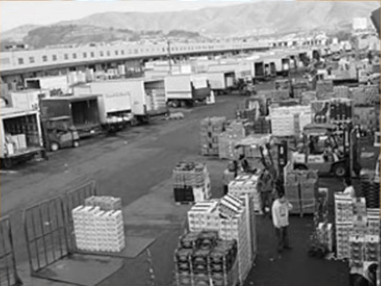
I drove the Volkswagen up to this thing. Trucks are pulling up, guys with hand dolleys are loading in cases of food, they’re all busy about their day’s work. I walk into this place, look around, nobody’s paying the slightest attention to me, so I walk around and look at a guy and I say, Um hi, I’m from the Diggers and um we’re giving away free food to poor people up in the City. Could you spare anything? The guy looks at me, he said Nope! And walks away. So I went, This is ridiculous, what has Brooks got me into, this is just going to be an exercise in futility. When can I go back to sleep? So I pull the truck out, I decide to try again for the next one. So I pull up to the next place and this is Chinese. So there’s these Chinese people running around, same thing, and so I walk up to the guy and say the same thing. Sounds pretty good, and especially if I say ‘poor people,’ that’ll work. So I say, Hi, I’m from the Diggers and we’re giving away free food to poor people up in the City. Could you spare anything? The guy says, No, not today. He walks away. I go back to the truck again, and then suddenly someone whistles. I turn around and this guy says, he points to something on the ground, and he motions. Like, Take that. There’s a case of artichokes. So I said, Oh! Thank you! But his back is already turned, and he’s already doing his work. So I pick up the case of artichokes, I almost feel guilty, like somebody’s gonna catch me, but I put in the van. Okay, at least I got a case of artichokes.
So I go to the next place. Now things are starting to work. People are giving me things. Here’s a case of tomatoes. Here’s a little bit of lettuce, carrots, parsnips, rutabegas — vegetables that I actually seldom eat. But I’m getting them, and the truck is gradually filling up. I come to the end of the thing and there’s a place that has chicken! And they give me three boxes of chicken wings, packed in this heavy cardboard with a little ice in it. So I take the chicken and then I cross over to the other side of the terminal, and I continue, and indeed some places say No, nothing, and other places say Yeah, take that. And by the time I’m done, the truck is [buckling] on its springs with the weight of all the food I’ve got. I’ve absolutely packed it. And I go out of the terminal and I’m unsure whether I’ll actually make it back up the hill with this thing.
Now it’s daylight. I’m feeling pretty good! I actually went and got free food without the slightest idea of what I was doing. I drove back up, and Brooks was there, walking down out of the house with a cup of coffee in his hand, and he said, Ah! You got the food, good! You can go to sleep now. But come up to the Panhandle Park at like Oak and Ashbury or something like that, and we’ll have the free food there, you gotta see this. I said, So this is the Diggers? And he said, Yeah I’ll tell you all about it later.
So I go up and I fall asleep for another four hours, and Brooks goes somewhere with the truck. I wake up and I make my way over to the Panhandle park, and I’m standing around and here’s six or seven people standing in line with wooden bowls in their hands, waiting. I look around. I look up the street. And there’s a couple of people coming down the street and my god, they have bowls in their hands too. People are gathering. They know about this place! Pretty soon I hear a shout. Here comes Brooks, up the street, it’s like it’s a stagecoach, someone’s driving the yellow van and he’s hanging out the door, waving. The van pulls up, the double doors open, and there’s one of those big old-fashioned industrial milk pails. It’s about 15 gallons of stuff. Two people carry it. So he comes over and he and I muscle the thing out of the van and we take it over and plunk it on the ground. And there’s one of those soup ladles, and he ladles out chicken soup, made from all the vegetables and the chicken that I’d gotten from the produce market. And somebody’s got a loaf of bread. And they start giving away food to these people.
Scenes from the Diggers’ daily free food event in the Panhandle. Photos by Gene Anthony.
I said, What is this? And he then explained the history of the thing, of how Emmett had decided to respond to the murder of this black kid by giving away free food in the park. And, just because of the kind of time it was, the logic of that was apparent to me immediately. Somehow, that connected. I think it’s an important connection because there was always a rapport between the black radical community and what we were doing. Y’know, they kind of did their thing separately, there was a Black People’s Free Store down in the Filmore. We were always connected with them and did things with them. And the Minstrel Show was a black-white thing. We always did things together. I remember one time, for a rehearsal for the Minstrel Show, we had done this thing… Well, first some background. Some of the Diggers had gotten these Gestetner machines. It was an early form of duplication. This was basically the propaganda organ of the Diggers. We put out broadsides, which were basically a piece of paper that was handed around the street. One of the broadsides was about this thing which we just saw, where traffic was congesting on Haight Street. Haight Street was becoming a tourist mecca. People would sit in their cars going five miles an hour down the street, leaning out, taking pictures of all the hippies gathered on the street, as if they were some kind of anthropological exhibit. We didn’t like that. We thought that there was a better way to have our public life, a better way to have the street there.
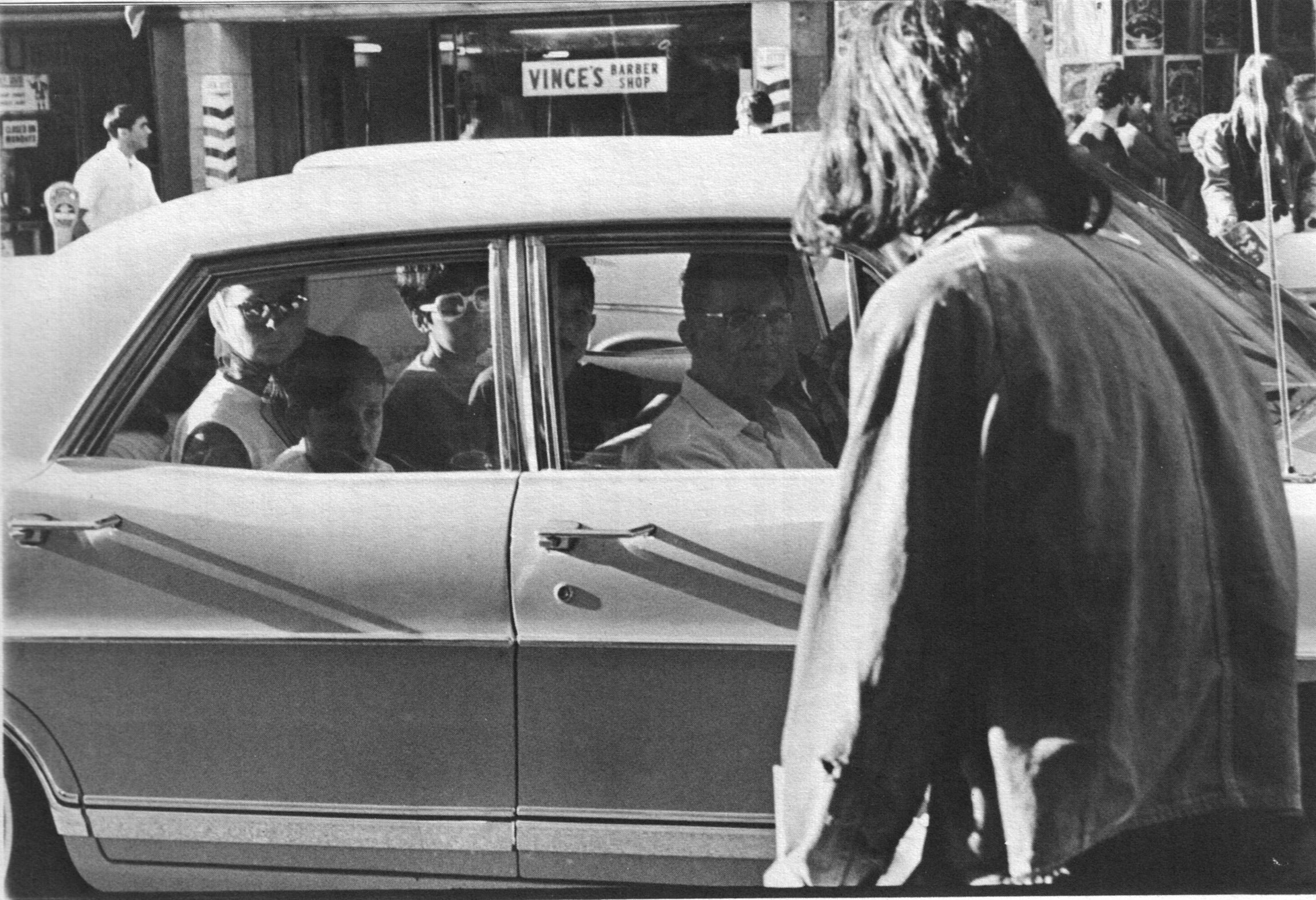
And so…this broadside had been put out by somebody, promising that the Diggers were gonna show up on a Sunday afternoon and clear all the traffic off the street.
So we were in this rehearsal in the morning, I think it was like noon or one o’clock, we got out of our Minstrel Show rehearsal, and I remember Willie B. Hart and Jason Alexander were there with us, and then there was Peter Berg, and me, and I don’t know if Peter wrote the broadside or not, but I remember he felt enormously responsible, because it was like we had promised the people that this was gonna happen. And then we went up there. Peter had this old Volvo, so maybe we all drove up in his car. But we got out of his car, parked it somewhere and we walked out on the street, and it was just so intimidating because from Broadway all the way up to Stanyan, it was just packed with traffic, and the sidewalks were packed with all these people. There must have been tens of thousands of people on the street that day. Oh my god, what are we gonna do. We told the people we were gonna clear the traffic off the street, how could we possibly do this?
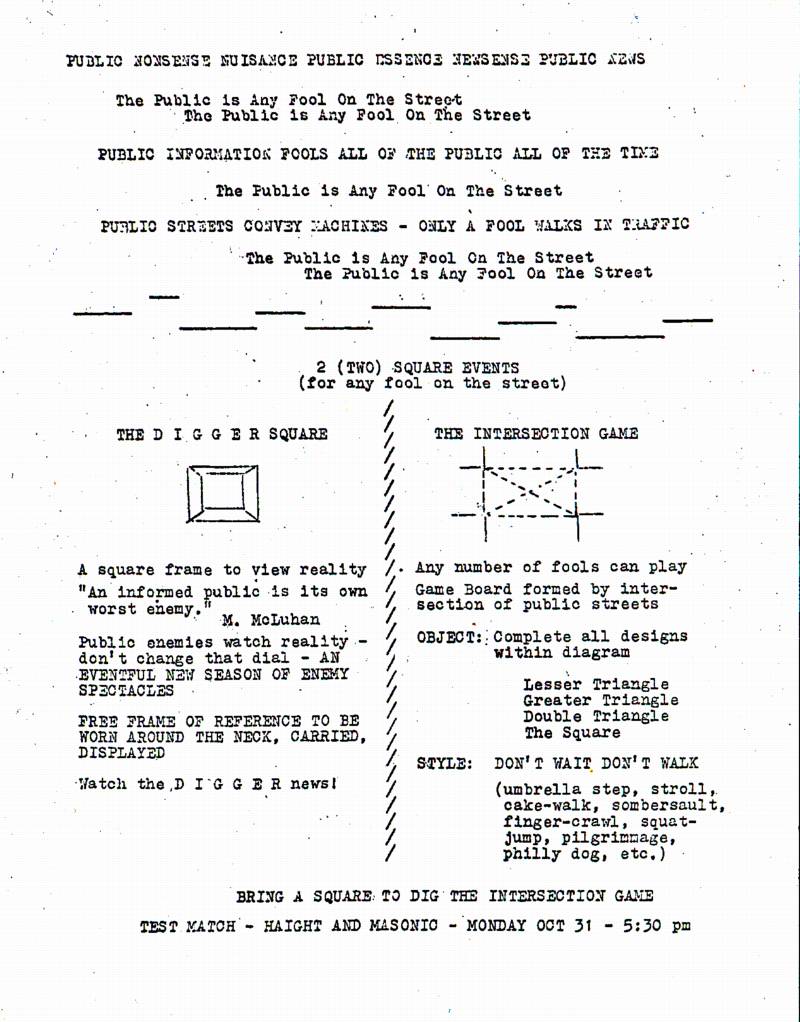
So we walked up, I think we were at Haight and Masonic, between Masonic and Ashbury, and there were so many people on the sidewalk that you couldn’t walk that fast on the sidewalk, but we made it that far and we were in consternation about how to proceed because we didn’t really have a plan of action at all.
Now, there was this song that we used as a warm-up in rehearsal in the Mime Troupe, which was a wordless round, very kind of stately. I remember always thinking that calm, stately music was a great way of organizing people, and during the Digger adventure, sometimes I would use classical music to offset the mad psychedelic frenzy of the music that was popular at the time. And this had this feeling. It was very ancient, almost medieval sounding. And I said, Let’s sing that. And the guys looked at me like I was nuts. Sing that? How’s that gonna compete with all of this psychedelic frenzy around us? I said, Well let’s just start doing it. So I started, and I remember I got Jason, Jason would agree to anything, so we started singing it as a duet, and it’s a five-part thing, and when you get the harmonies going, it’s kind of resonant, but it’s slow and stately. And we started singing this thing very quietly. And so we formed a group on the street and as people passed us on the sidewalk, they went, Whoa what’s this, what’s happening here? So they would start, and we would turn, and we would, just in pantomime, teach them the thing. We just simply proceeded to sing it ourselves, but got them to sing it along with us. And then Peter and everybody started singing it as well.
So there was a group of us on the sidewalk, and we filled the sidewalk, and when the sidewalk filled up, in order to get around, people had to go between the parked cars, or even walk streetside of the parked cars, out almost in the traffic. So there’s a little cluster of people on our side of the street, and over on the other side of the street, people noticed that something was happening. So they stopped and looked to see what that was. So then there got to be a cluster on the other side of the street. So we beckoned them, Hey come on over and join us. So people dodged through the slowly moving traffic and came to our side of the street and the cluster was bigger and bigger, until actually the cluster amoeba-like joined the cluster on the other side and so there were people moving across the street so much, that we’d actually in fact blocked the traffic. And, since the traffic was one-way, the street gradually cleared.
Then the police showed up, and they barricaded off the street so the traffic had to go up to the side streets. We had inadvertently just occupied a block of the street. We hadn’t cleared the traffic off all of Haight Street, but we’d cleared the traffic off one block! So then we looked around and suddenly the street was just filled with people, and they were all celebrating and happy. I remember looking over and there was some group had a long staff and on it was a big circle with some mystic symbol, and they had a live white rabbit with them. And I didn’t know what they were doing but they seemed to have their own thing, and they were intoning something of their own, because at this time, whatever songs had spread, millions of songs had filled the street.
I remember thinking in the back of my mind like a strategist, well if we’re clearing all the traffic off of the street, how do we get past the police? We have to take over another block, but the police have set up a line of sawhorses to contain us. And they had paddy wagons and all that stuff, almost like they were ready for a riot. And everything was so joyful and so wonderful in a way, that it clearly wasn’t a riot. But I didn’t know how to get past the police. I was really helpless to do anything. These people with the mystic symbol and the rabbit, they went up to the police and they started doing some religious ceremony of some kind, singing to them or something, with the symbol, holding the rabbit high in the air, they were doing this thing, I couldn’t hear what it was—something—and the police just looked at them, picked up the sawhorses, threw them on the back of the paddywagon and split.
And we moved across Ashbury, down toward the South, we started advancing, and the cars went off down the side streets, and we took over another block, so now we had between like Masonic and Clayton, two blocks of Haight Street, was completely cleared, filled with cheering people, and then the same thing happened at Masonic, and we went on further south and further south. Now the police were all the way down by Buena Vista Park, clearing traffic, and we went all the way down to Buena Vista Park, we looked back. Let’s go up to Stanyan, which wasn’t that difficult cuz since it was a one-way street, the traffic had sort of cleared itself. So we did, we walked all the way several times between Stanyan and Broadrick. We’d done it! We’d cleared the traffic off Haight Street.
I remember walking around and seeing Arthur Lisch. Arthur had found himself a box of colored chalk, and he was going around the street, creating a new environment, a vision of the future, this is what the street is gonna be. He would draw out a garden, with the carrots and the celery and the peas and the corn, and he would draw out a meditation center, and here’s where a little brook could run, and here’s where a park and a playground for children would be, the solar energy collectors, and all. He just drew it in chalk all over the street. That’s what the street is gonna be. So he just created that vision of it and people started doing that.
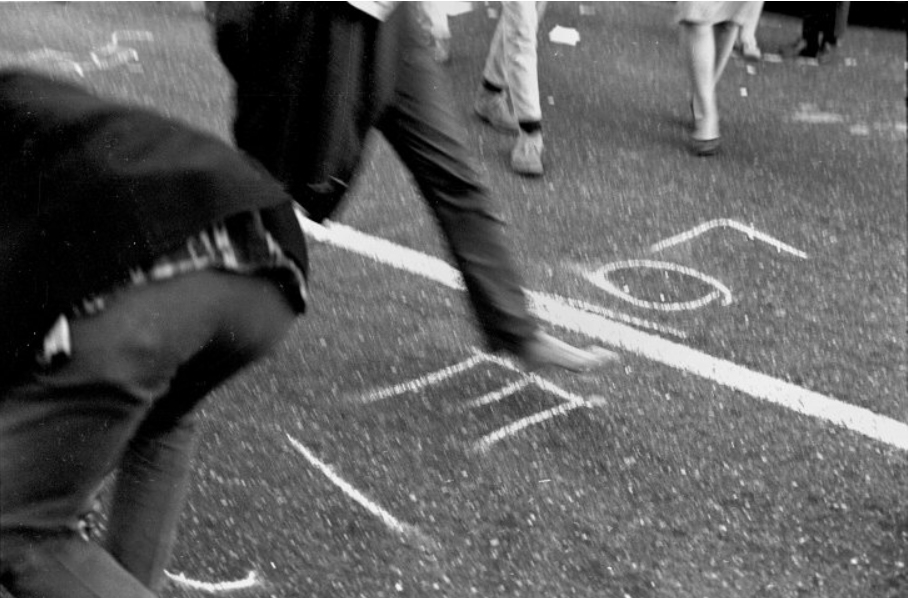
I remember we just walked back and forth and said, Well, we did it, and it was 4 o’clock in the afternoon. Jane Lapiner had a place on one of those streets off of Haight, south of Masonic, and we all went over there. And I think we heard later on that the police did sweeps of the street and clubbed people and arrested people and stuff. But I think after that, a permit for a Haight-Ashbury street fair was applied for and granted. So that was sort of the first Haight-Ashbury street fair. And I think they’re still happening today.
Do you remember what you sang?
Yes. It goes like this. [sings]. So that’s five of those and if you do it alternately than anything harmonizes and you’ve got a five-part round. It was something that somebody brought into the Mime Troupe and it was used as a vocal warm-up.
Can you talk about the street event in which you got arrested?
A lot of that was dedicated to confronting the issue of traffic on Haight Street. Now, we had this thing called The Free Frame of Reference. It was basically made out of four yellow 2 x 4s bolted together at the corner and they were about maybe ten feet long or something. Just enormous. It was just a big square. We called it the Free Frame of Reference. And so whatever was inside the Frame of Reference was, allegedly, free. And so, people would look at this thing and go, …Okay? So what is that? Clearly, unmistakably it was just a big square made out of 2 x 4s. It was nothing, you know? But then it was a frame, also, so you could put it around something and then look at it.
Did it actually say ‘free frame of reference’ on there?
I don’t think so, but I don’t really know. There probably is a picture of the damn thing somewhere but I don’t know.
Now, in that picture, which has us all jumping around on the steps of City Hall, there’s a guy with a beard—Robert LaMorticella, who was a master puppet maker. And he made these puppets that were about eight feet tall, and they’re all made out of the kind of dowling you use to hang your clothes on in the closet. There’s a big long piece of doweling, basically across, and the cross member would be the shoulders of the character, and then he would make this big papier-mache head on top and then there would be a piece of clothing that would come down in sleeves, and the sleeves were just hanging cloth. At the end of the sleeves on two pieces of plaster lathe, were the hands. So the basic art of the puppet was a head and two hands. He had these puppets which were originally made for Robert Scheer’s campaign when he was running for political office. His opponent was a guy named Jeffrey Cohelan , and at the time, Scheer was represented as a forceful guy who could make gestures like this [fist into hand]. He could go like that. And Jeffrey Cohelan was represented as a kind of dithering, insubstantial person who would go like this [makes motion of sad hands].
We had these two puppets. And you could put different kinds of costuming on them to make them different things, so we just immediately adapted them to whatever characters we wanted. I can’t remember exactly what we were doing with them but I remember I had the forceful Robert Scheer puppet.
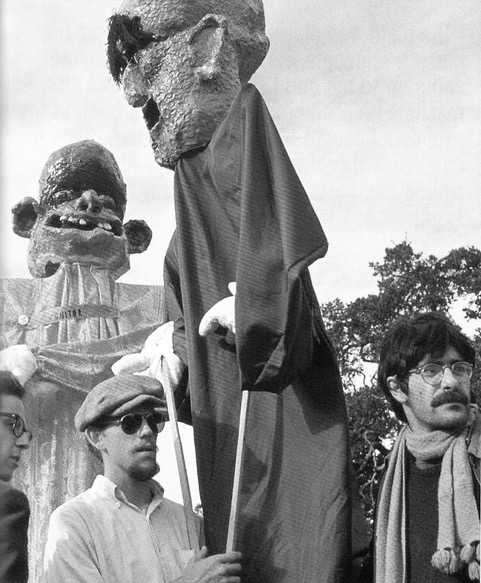
So we were all on Haight Street, with the Free Frame of Reference. It was getting to be dusk. We were in and out of the Free Frame of Reference. So we would go into the Free Frame of Reference and act through it, then we would go around outside it and act outside of it. What I noticed was that the puppets were so huge that you could take a puppet and you could incline it down so that a person driving a car along the street would suddenly have this head looming down into their windshield. That actually seemed more fun than doing anything with the Free Frame of Reference. So we actually began intimidating the traffic with the puppets, and shaking our fists into their windshield!
We continued doing this, and then, the police came and arrested us. They collapsed the Free Frame of Reference, took it apart, made it into four two by fours. They took the puppets and stuff and they threw all this in the paddy wagon, and took us off to Park Street Station. So there we were, late at night, sitting in Park Street Station on this bench, and we just watched the life of the police department for a while. Police would come in, chat with each other, one cop would look at the other and say, Who are those guys, what’d they do? They said, They were giving a puppet show on the street corner. Puppet show? You arrested them for doing a puppet show?!? He said, Look at the puppets! They’re eight feet tall! Oh okay, well then. Because the puppets were so big, that meant that we must deserve to be arrested. [chuckles] So we just watched all this.
Who was in jail?
Brooks, me, Emmett, Peter Berg, and I think Roberto as well was there, cuz Roberto didn’t let those puppets out of his sight. So there were five of us. I guess we spent the night in jail, I can’t really remember. But the next day I remember out attorney was Richard Wertheimer, an amazing man. He had some disability where he was in a wheelchair all the time. He just had this quiet, loving attitude. He talked to us and said, Well I know the assistant D.A. so let’s go talk to him. There was a court date. We were arraigned and brought into court. I remember Dick took us into this guy, the assistant district attorney for San Francisco, his name was Artie Schaffer. He looked at us and he said, You guys. Okay. It’s clearly freedom of expression issue. We’re gonna get this thrown out of court, I want you guys to know. Now get out there and make revolution or I’m gonna bust your asses. These guys were old Lefties from the ‘30s that had gone into the Establishment and so there was a deep kinship between us. And this was the first time I really noticed that there could be something like that, that we could have a real kinship of purpose with people who are inside the Establishment and had positions like assistant district attorney and stuff. It was a very interesting thing.
So then what happened in court was really of no interest at all. The judge was told by the assistant district attorney that they were dropping the case. He was a little miffed at having the court’s time wasted and stuff like that but he couldn’t do anything. It was one of those miracles. We didn’t know what would happen to us. Strictly speaking, we were blocking the sidewalk. We were intimidating the cars. I didn’t know if they had witnesses or anything. Could we spend time in jail for this? We had no idea.
So we were absolutely delighted about the way things were turning out. It was almost like the world was saying, Just keep doing that. Even the assistant district attorney of San Francisco was telling us to go out and make revolution. To do what we were doing. We were doing just the right thing. It wasn’t a bunch of dropouts who got it, these were like major people in the society, who saw what we were doing and saying, Yeah, do that! This was important because as we were going along with this thing, a person might have some self-doubts, like, Is this just completely insane? We were used to protest. Clearly the Vietnam War gave a legitimacy to doing something different besides what was going on in society, but of course once you start actually doing something, you might question its value. A free store — is this just a dump? Sometimes you’d go in the free store and it would look great, you could see how somebody could walk in there and find a Harris tweed and have their mind blown. But other days you’d go in there and it just looked like chaos. And then a third day you’d go in there and something equally beautiful and amazing would be happening. So you walked around with this question in your mind. Clearly we were onto something, but where was it going, where could it lead? Everything we did had no plan at all.
And so doing something like that Free Frame of Reference puppet show, which was totally an improvisation without a structure, what were we really doing? And I myself was distracted from whatever play Emmett had in mind, cuz Emmett had this idea of the Free Frame of Reference and we’d do a play with it, and this would really be something that would change people’s minds. And maybe it did! I don’t know, I was distracted by shaking my fist at the windshields of the cars, and that’s what happened to me. Again, without it being planned, things happened. Would they be positive, would they be negative? I was never sure. I’ll tell you another story in a minute because it really brought the thing home, because when you don’t have a plan and you don’t know what you’re doing, you could actually do something really stupid. It’s possible.
So we were at this point with Artie Schaffer telling us to go make revolution, we were at the point of absolute exuberance, because it was almost like the stamp of approval. Yeah, that’s right, what we think up on the spur of the moment, is PURE GENIUS! So that creates the feeling that’s expressed in that picture. The outrageous thumbing your nose at the Establishment and my expression of…the King Kong of revolutionary exuberance. You could see in Emmett’s stance and everything, almost a criminality, is being expressed in the picture. All of those things were just sort of there. Here we are, we’re at large, free to offend again. And we will.
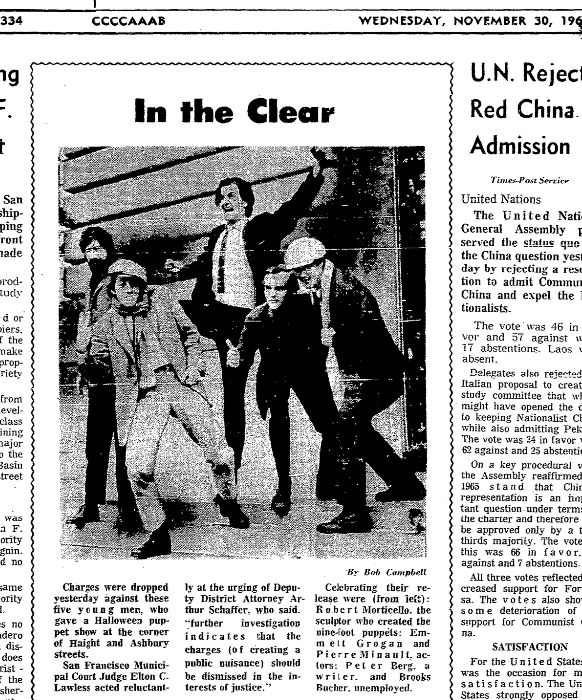
There was another event that came up… All of these things really had to do with taking over public space, and the space that was most available for us to take over was of course Haight Street. There was an event. We had started meeting the Hell’s Angels and talking to them. We found that the Hell’s Angels were incredibly sympathetic to what we were doing, and of course the ‘free love’ and everything like that we were doing was very conducive to their rapport. But they liked us, and seemed to be willing to give up a little bit of their violent demeanor in order to be around the hippies and enjoy the opportunities that our culture created for them.
There was this guy named Chocolate George, a Hell’s Angel, and, during one of these events, our friend Phyllis [Willner], got together in this magnificent white gown and Chocolate George drove her down Haight Street, STANDING, on the back of this motorcycle. Spectacular piece of theater. Just looked stunning. So Chocolate George drove down Haight Street with Phyllis like this, and when the police saw that—there’s certain things that push the buttons of policemen and that would be one of them. I guess the technical thing is, Don’t stand up on motorcycles, that’s illegal. But, she did, and so Chocolate George was arrested. I don’t know if Phyllis was or not, I don’t think so. But a couple of the Hell’s Angels, Chocolate George and Harry the Horse, were arrested. And that made me angry. The Hell’s Angels had this kind of more outlaw, more criminal image than we did. But this event, this was our event. This was our celebration. And yet they went and arrested the Hell’s Angels. They were arresting the thing most obviously offensive to that middle class sensibility. Let’s get those Hell’s Angels! Yeah, that’s it.
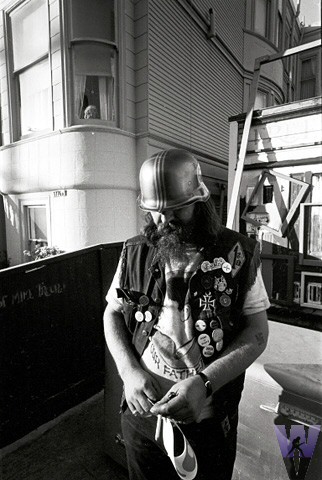
The news spread around the street. It was getting to be dusk on Haight Street. People all over the street. I remember feeling so incensed. I did this stupid thing, out of a B movie, but I was seized with anger about this, and I got up on to a roof of a car that was parked on the street, and I said THEY’VE JUST ARRESTED CHOCOLATE GEORGE AND HARRY THE HORSE! TWO OF OUR BROTHERS! LET’S GO DOWN THERE AND GET THEM OUT! And I got down off the street, off the car, and I started walking up Stanyan Street towards Park Street Station. And after I walked a block I turned around and by God, there were a bunch of people with me. I couldn’t believe it. It was again one of those things, Oh shit. I might be doing the dumbest possible thing in the world. I might be leading a whole bunch of unarmed people up against the San Francisco Police Department. But, I was already in movement so I kept on going.
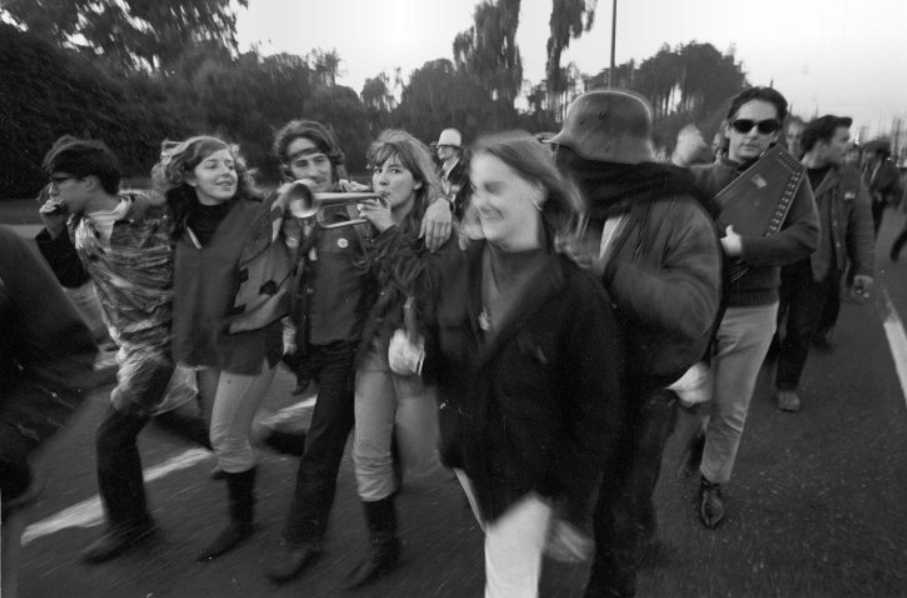
And people moved through the dimming light up towards the stadium there and Park Street Station which was in the shadow of it. Park Street Station was right up against the stadium, and the stadium had these huge walls, so you could kind of…corner them. So actually, without quite thinking about it, this enormous group of people, must’ve been close to a thousand people, suddenly moved up to the station, and SURROUNDED it. We had them surrounded.
So now, this is the point where it’s good to have a plan, and we didn’t. So what happens when a thing like that occurs? The policemen were looking out the windows, Oh my god! Y’know? They were indeed surrounded. You could see the look on their faces. They didn’t know what the hell to do. I remember [poet] Michael McClure, coming and talking to me and he said, What are we gonna do here? And I was like, Uh I don’t know. I had no idea. But I saw that a bunch of the women were handing out candles. Somewhere they’d gotten candles and they were lighting the candles and so this candlelight spread out all down the line of this surrounding bunch of hippies. And goddammit, they started singing Silent Night.
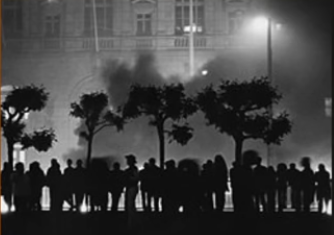
And it was actually the perfect thing to do, cuz it has all these peaceful words and this peaceful sound to it. So suddenly they were surrounded by peace. And the event completely turned different. So then somebody went in there, it was either [poet Richard] Brautigan or McClure, somebody like that, and these guys were a little older, you gotta remember I was like 23 or 24 years old at the time, and these guys were in their mid-30s. They were already established writers with reputations and stuff like that, so they were more comfortable walking in and talking to the police and presenting the image of a mature person. They indeed said that we thought it was wrong to have arrested these guys, that they were part of a peaceful activity and they were in no way a threat to public order. And the police said, Well in fact it is illegal to stand up on a motorcycle, and maybe Harry the Horse had been drinking on the street, or something like that, but we established that the legal representation that we had enjoyed would be available to them as well.
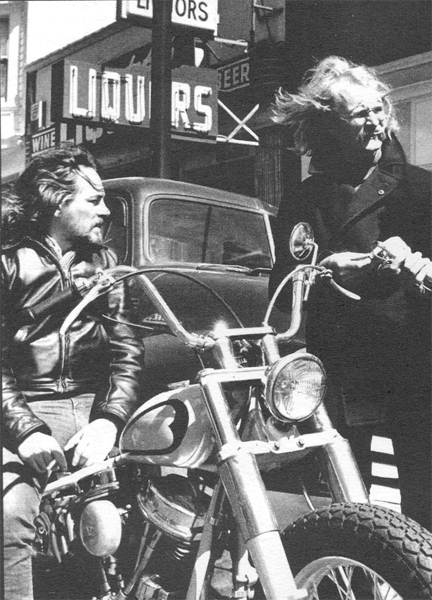
So they did indeed have to spend the night in jail, but we also let the Hell’s Angels know that we were good hosts, and would be able to take care of them to the best of our ability. So we weren’t able to go down there and attack the police station and spring them out, which had of course been my initial impulse, frenzied fool that I was, but nonetheless, the event turned out well. So again, it’s just another example of how some insane impulse was made sane by just the social environment that we were a part of. And, violence and insanity were avoided by just the inspiration of somebody, I don’t know who, to light candles and start singing Silent Night. It was absolute genius to do so.
The Angels and the Diggers became close…
Lots of close personal relationships started happening. I remember later on Peter Coyote was over there, and he bought himself a motorcycle. Billy Fritsch [aka Sweet William Tumbleweed] bought a motorcycle. These guys helped them paint the tank. That’s what you had to do, you had to paint the tank, that was your personal statement. I never got into that, but I did visit with them, I was over at Pete Knell’s house a few times.
What are your memories of Emmett Grogan?
Emmett was an actor, and he was in the Mime Troupe with us. The whole thing started out of Mime Troupe activity. I remember Emmett being in Olive Pits and creating these characters.
One of the most interesting things that we created was a little play called Search & Seizure. This was the brainchild of Peter Berg. The idea was to do the play in little clubs and things. It was a police line-up play. The characters were four policemen and four people who’d been busted for different drugs. I remember I was a cop, and we all used our real names. There was somebody busted on downers, somebody who was busted on speed, somebody who was busted for grass, finally somebody was busted for LSD. The police were able to break down each person, but not the acidhead. The acidhead I believe was played by John Robb, a phenomenal actor. The acidhead, in this characteristic way, by changing the frame of reference, turned the police around and was not broken by them. The play came on completely opposed to the usual style of Mime Troupe plays. It was a piece of gritty realism, in which we actually created a realistic police line-up type of environment. I remember we did this at The Matrix. At the time there was a band playing there, Country Joe and the Fish, and so we shared the backstage with them. We would do our play and then they would do the second set. And I remember coming back there and them going, Jesus you’re supposed to scare the shit out of them, not us! So the play was this terrifying little jolt. Emmett played one of the police officers. And his forceful personality and his New York speech rhythms created a really terrifying character. In terms of being an actor, that was really one of the best things I’d seen him do. He was the one that created the jolt of adrenaline in the play, and he could really do that.
He had come into the Mime Troupe. His face was amazing. If he’d really wanted to be an actor, and maybe he did later on, because he came down here to Hollywood, I think somehow later on toward the end of his life there he was actually seized with the Hollywood thing… Anyway, his face was crooked, I think that his nose had been broken at some point. And he had this jawline and these goggly eyes, and he had a way of looking out of the side of his eyes.
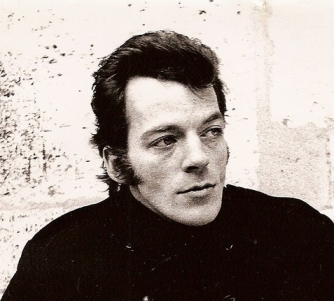
And I remember when he walked, his hands faced straight back. It gave him this hunched swagger. If you look at Ringolevio, there’s a picture of him walking across one of those New York streets with the look of a guy whose jacket isn’t warm enough against the cold. And he favored military fatigues and things like that.
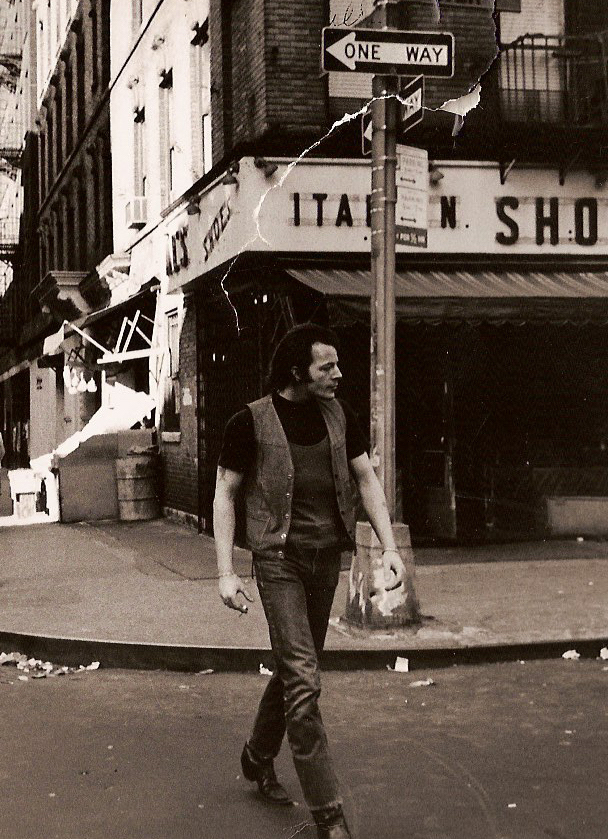
It’s a working class face. And he’d been in Italy, so he could speak Italian, and that was what gave him the cache to talk to those guys at the produce market and make the original foray into the free food thing. Something that I wouldn’t’ve thought to do. Once it had already been established that one could do it, even a guy like me who was half-asleep could blunder through it and get the free food. But Emmett actually went down there, and talked to them in some way… To have been a fly on the wall at that time, to hear that conversation, would have been incredible.
Who was Billy Murcott?
He seemed like almost the sidekick? Emmett would be the guy with the personality and the force. But it’s interesting, because Billy wasn’t the comic sidekick so much—he really was the brains. Billy had this gift of language, and I think he gave the gift of that kind of Digger poetry to Emmett. And together somehow there was a symbiotic relationship. When you read some of those Digger broadsides, the way they use language is very interesting. It has an inheritance from beatnik poetry, and indeed Emmett was pretty close to Gregory Corso. And he brought Gregory in, and Gregory hung out with us a lot.
DH: Emmett called Gregory his favorite poet.
Right. There’s a quality of incantation in the language. And what the Digger language would do would be to break up sentences and re-arrange words in a manner that was sort of like Beat poetry but also psychedelic, so it was like: “Take a cop to dinner. Cop a take.” And so he would take words like that and re-arrange them and create a different meaning of it. What was that? Take a cop to dinner. It was about bribery and corruption. Copping a take. Suddenly reversing it would make the language hip and streetwise. So street language had this almost coded or incantatory quality to it. They were able to write it down, on one of those broadsides, so that, passed out, it would really have an effect. It would create this thing where people were all communicating on the same level.
“Today is the first day of the rest of your life.” Some people say the Diggers popularized that slogan…
Yeah, I think they may have. I guess if you asked me off the top of my head I would say Emmett made it up, but it could have had an earlier literary reference. The language trips, that is really what Emmett and Billy [Murcott] brought to it. You have to look past Emmett and see Billy as the source for inspiration.
Speaking of inspirations. There’s a Com/Co broadside that advertises a screening of the film Miracle in Milan at the Free Store.
I believe Arthur Lisch brought it to us. It was a movie that in some way was about what we were interested in that this guy [Italian Neorealist filmmaker Vittorio] De Sica had made, and yeah, we showed it. It was a movie about an essentially free activity. It showed what a free frame of reference would look like in actual practice. I think at some point in the movie the squatter village is oppressed by the authorities. At the end they fly off to heaven or something, an absurd ending, which by its very absurdity makes the point. Even that, the absurdity of the ending, helped, because again, it’s that kind of beatnik thinking, whereby taking something in a completely different direction, the mind goes where you want it to go. And that was a lot of what we were trying to do.
Arthur was very interesting. I don’t recall Arthur ever having really long hair. He came in from churches. He would always relate things to churches, and felt that churches should be doing things, so he had a spiritual component to the way he thought. He would always do interesting things. He would frequently be at our events dressed in a coat and tie, and would do things like sweep up. He would take care of the janitorial work and make sure that everything was clean and well-organized. He would basically take on that role of representing a clean, well-organized vision. It could be free, and clean, and well-organized! WHY NOT? He would think that.
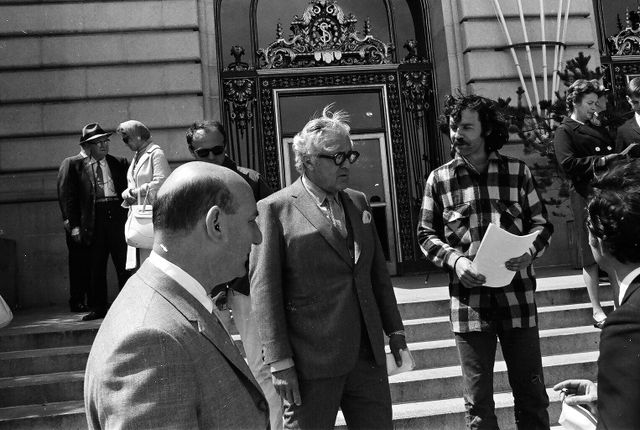
Do you have any memories of the Invisible Circus event at the Glide Church?
The thing I do remember about it and was interesting politically, and this is really about Emmett, was that Emmett really saw something that…I don’t know… If you could, like, bottle this insight, and let everybody’s who’s politically active just drink it, it would make such a huge difference. He saw that it was all one thing, that we’re not separate political movements. He was really interested in making connections with everybody who needed to be liberated—that felt the need to be liberated. And that’s why he felt this kinship with the Black Power movement. There was a time when he went, and I remember him saying this to me, he said, We need to get together with the fags. He put it just like that. The fags, man, that’s where it’s at. Let’s go meet the fags. They’re down in the Tenderloin. And that’s what really brought us to the Glide Church. The Tenderloin has a big gay population. And he wanted to be closer to the gay thing. He felt that that was a real source of kinship—that they got something that we needed to be involved with, and that they needed to get what we were involved with. He really led that. That’s one of those things that would never have occurred to me, that he saw immediately. Gay culture had been part of a demimonde, an underground culture, and he wanted to share and participate in bringing that up above ground, making it part of the big dialogue. Of course, later on, that happened. But he was talking about that in 1966! That’s what’s interesting.
The gay population is a big part of the ministry of Glide Church. So I think that’s really what brought us there. Conceptually, again, we just didn’t have the framework for properly dealing with that or making the political connections. But that’s an interesting part of the Digger thing. As I look back on it, sometimes I think we made big mistakes. One of the mistakes we made was we were against voting. We had a big campaign: “Vote for Me.” So you’re your own representative. Okay well, I can see the logic of that, but being against voting? That’s stupid. We shouldn’t’ve been against voting, we should’ve figured a way into that.
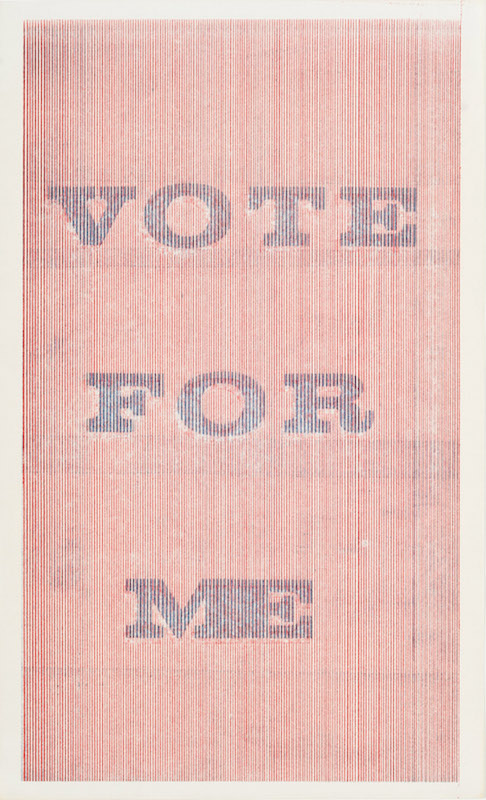
The point was that the democracy was supposed to be participatory, and in order for that to happen, you had to de-ghettoize life. You had to break down walls that separated people into little groups: the blacks, the gays, the peaceniks, the hippies. You had to say, The hell with that. And so that was one reason why we had that big ‘Death of Hippie’ thing. We couldn’t be ‘the hippies,’ because that was a bag they put us in. We never invented that word anyway. So one of the things politically that I think the Glide event was supposed to do was to un-bag everybody. To get people in there together.
And in a way, the Tenderloin was more representative of that than the Haight-Ashbury. The Haight-Ashbury at that time was still kind of a white neighborhood. You look at the footage and yeah there’s some black people around, but the black people in San Francisco thought of it as a white place. And it was. The Tenderloin, however, that was GENUINELY multi-ethnic and multi-sexual, multi-EVERYTHING. So that was really the melting pot of San Francisco. And so if you wanted to have a political or social or artistic activity that broke down those walls then going into the Tenderloin was the way to do it. And I think the Invisible Circus, it actually did that in its outrageous way. I have no way of evaluating the consequences of it. I just don’t remember. It’ll be very interesting for me to read Cecil Williams’ book and see what the reverend thinks of that, because yes, we damn near wrecked his church, I think.
Above: Kent discusses his sizeable contribution to the Invisible Church event.
DH: Cecil Williams saw it a moment of affirmation for him… He insisted on the “fuck the church” graffiti in the bathroom wall be kept up.
I always thought Cecil Williams was such a cool guy. The forces that he brought into that church made it what it became. And, you know, a lot of things that we did continued there. They started a huge free food thing. So yes, Cecil Williams was definitely a kindred spirit there. The idea of “fucking” the Church I think was sort of part of a different kind of spirituality that was coming out of what we were doing. As Diggers I don’t think we really addressed that very much but there were later on many of those people went into various spiritual things. When we went on into the ’70s, people went into things that seemed really wacko to me but the thirst for a spiritual discipline or spiritual life definitely came out of that stuff.
You guys were thinking politically and economically, but you guys were actors, not activists.
The essential vision of the Diggers is economic: We’re gonna do economic activity without money. And that was sort of the point of it. So it started out with the free food. And then, we set up the first free Haight-Ashbury medical clinic — it wasn’t done under proper Establishment auspices, and subsequently I think they set up what they would call the ‘real’ one, but we had doctors there that were actually giving, prescribing medicine, treating people. Then we set up the free store.
Ronnie Davis connected us with a politically active tradition. Later on, the Mime Troupe became a blatantly Marxist company, although at the time we were there… I mean there were Marxists in the company, and SDS had a little office right next to the Mime Troupe’s studio and they had a mimeograph machine that churned out their broadsides. So we were in conversation with people in SDS, student radicals, Marxists, anti-war people who favored the idea of a possibly violent revolution that would overthrow the government. We would talk about that, think about it, but… I remember there was this British guy, Ray Davis, who would hang around with the Mime Troupe. And in the Mime Troupe we would have these big meetings sometimes where we would discuss very big things, and I remember he got up one night during the meeting and he said, ‘I think we should all agree that capitalism is the worst system ever invented by man, nature or circumstance.’ And the entire room burst into laughter. That was kind of the relationship that our circle had towards Marxist communism at that time, that it seemed something that was so filled with pronunciamentos like that was ludicrous. It would have been difficult during the ‘60s for us to say, We’re Marxists, or, We’re communists. It’s not that the ideas of a cooperative or a planned economy were somehow bad or anything, it’s just that it was a style of thinking that would just make us laugh. And Ray was part of a slightly older generation more conditioned by the ‘30s and so while he thought that was such an important idea, that if we could all agree to it, it would make us all so much more powerful… Nah. The thinking had moved beyond that. It just couldn’t be there.
At some point the two Peters [Berg and Coyote] and Emmett and I and a few other people were basically saying, We’re not gonna do another play with the Mime Troupe. We’re gonna go out in the streets and we’re gonna do Diggerly-dos because THAT’S what theater really should do. We don’t want to put on a play and then have people go home afterwards — we want to actually CHANGE the public reality that people are in. So at that point we were like — we took over City Hall! And did shit like that, read poems on the steps.
There was definitely a separation between the radical political thinking and what we were doing. I don’t know how healthy that was. Because I look back now on the antiwar movement and everything that was going on and it seems to me, when you look at it from the point of view of political history and you see, take ’68, the assassinations—Robert Kennedy, Martin Luther King—all these people that got assassinated at that time, you think, King started talking about Vietnam. A few months later they killed him. And the same thing with Robert Kennedy. He was talking about peace in Vietnam and linking the antiwar movement to the civil rights movement. And it seemed to me that everybody who started talking about making connections between those two things got killed pretty soon after. That’s what they were afraid of, for it all to come together. Cuz all the pieces were there. And so if you were running the government and wanting to keep everything as it was, having all that come together as one thing, that was the threat for you.
Peter Berg talked about the importance of LSD as a catalyst, and a dividing line with the past.
Yeah, I think so too. And that was the point of that play Search & Seizure, is the final guy [played by John Robb], who is on LSD, he couldn’t be broken down because his point of view had changed. He had a new frame of reference for his life and his thinking. And that’s what we were all looking to do, was to let our lives incorporate a new frame of reference. Calling it a frame of reference is a little weird because a frame is a square box with defined borders and that’s exactly what we didn’t have. We didn’t know what limits we could have. Coming out of the Digger period, many of us left San Francisco, we went and we started a commune up in Ron Thelin’s house, and the women took over and said Okay now it’s time to make babies. So the next thing after that was really becoming a family, and having our own children, and raising our own children and seeing what that would do. Of course, the thing that it didn’t do was make us go back and become squares again. It actually forced us to bring up our children in a different way.
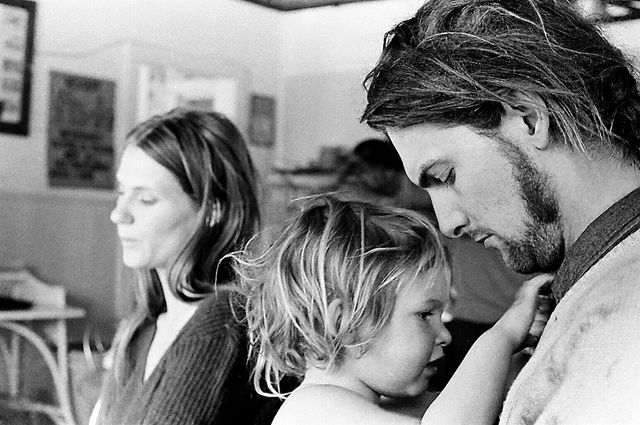
What was your family background?
My family background is quite normal. I’m an east coast boy. I was born in Brooklyn. My family moved around a bit when I was in my infancy: Virginia, upstate New York, Bingington, places like that. When I was 7, in 1950, we moved to a suburb in Boston and that’s when my parents really felt at home. My father’s an immigrant coming over from France when he was 17. He had a constitutional terror of poverty. He had been poor in France as a kid, and then he had been poor as a young man in the depression and he had worked his way out of that. He got here in 1929 and immediately the stock market crashed. He managed to wash dishes and get a mechanical engineering degree at Ohio State University where he met my mother, and then graduated from university with this great degree in the middle of the Depression, where he didn’t really have any employment options, and spent a few years that were fairly depressing for him. He was teaching French at the University of Chicago which is not what he wanted to do. He wanted the roar of the factory, he wanted to engineer shit. Then he got tuberculosis, he thought my mother would leave him just because he was a total wreck. But then, they came out of that and as the armament industry started gearing up, really getting ready for World War II… the armaments industry knew what was coming, so ’37-‘38-’39, somewhere in there, he got a call, and he got brought into a company called at that time Sperry-Rand, which was a big defense contractor, and so he was well employed from there on in. But he would go from a variety of companies — he was a very smart man — became plant manager and stuff like that. I was sent away to a prep school, Principia in St. Louis, and given a nice education by prosperous middle class parents.
During the ‘60s, when I was in San Francisco, having dropped out of society and become an actor… I remember, they saw me perform with the Mime Troupe in Detroit, and I remember they were really angry about that. They just thought that was an awful thing for me to be doing, to be doing theater, like that. My mother tried to be understanding and my father sat off resentfully by himself.
My younger brother Paul, who’s now an attorney, visited me at that time and I remember he expressed a traditional middle class horror at the way I was living. At the time he was terrified of the draft and he was hoping I would save him because of my ‘superior wisdom’ about that.
How were you avoiding the draft?
I used my acting skills. It was appallingly easy.
You’re often mentioned in the Grogan and Coyote books in association with the Digger trucks…
Yes! One of the things that happened to me was I became Pierre Le Truck. During the Diggers stuff, trucks became very important because the Diggers were always moving stuff around. There was a point during this time that I had no car, y’know. When we opened the free store, somebody came by and said, Here’s a free car. It was an old Studebaker Lark. So I got in it, started it up and it worked. Okay, I’ll take the free car for a while. I think it wasn’t a day before I piled the thing up. I wrecked the car and I walked away from it. To whom was it registered? I have no idea! Free cars, this wasn’t gonna work. Free stuff was great but free cars was an administrative hassle that we couldn’t handle. I was moving stuff around, we were borrowing trucks from people… It was clear that we needed trucks.
There was a guy named Jonathan Glazer — Jonathan and Sara, I remember they were close to us but I don’t quite remember what the source of the connection was— Jonathan had an old ’51 Chevy pick-up that he wasn’t using, there was something wrong with it, it didn’t work. And so I think Billy Fritsch went and talked to him and said You gotta give the truck to Kent. There’s something about Billy, when he used a certain tone of voice, you just had to do what he said. So they give me the pink slip, but the truck is on the street. I could have the truck—but I had to fix it. I had no idea how to fix anything. I had studied anthropology in college, how did know how to fix a truck?
Billy said, Well you gotta get the repair manual. How do I get a repair manual? He says, Listen. Talk to [poet/Digger] Lenore [Kandel]. And she said, Go to the Reference Desk at the library! They’ll not only show you the thing, they’ll photocopy the pages for you and give them to you. See, Lenore did charts, she was an astrologer. When you’re into astrology, you have to get a thing called an ephemeris. If you were a really professional astrologer, you have to have all these books that show the position of the stars at various times to do your chart from where the stars were at your birth. She didn’t have them herself, so she went to the library. She knew how to use the reference desk. So she said, you could do the same thing for auto mechanics. Aha! The library was very cooperative. I ended up with this bunch of papers. Somehow we got the truck towed to a place. I had a friend who ran a garage nearby, and would help the Diggers with various things. So he showed me what to do. And I remember my friend J.P. Pickens had a hot Sears credit card. So we did this act of criminality. We went to Sears with this credit card, and I bought all these tools—the wrenches and the sockets and everything that you needed to fix the truck, outside of the machinist work. We were constantly fixing up Chevy pickup trucks. Everybody had to have a Chevy truck. They were all not working cuz they were 15 years old at the time. We became obsessed with machinery. We learned how to fix more and more components of the engine. And I would get more pages out of the library and I would build myself a little book. And that’s what made me Pierre Le Truck.
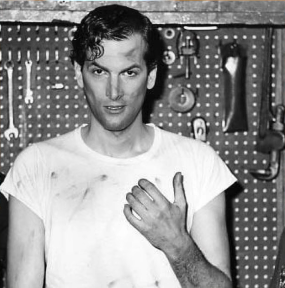
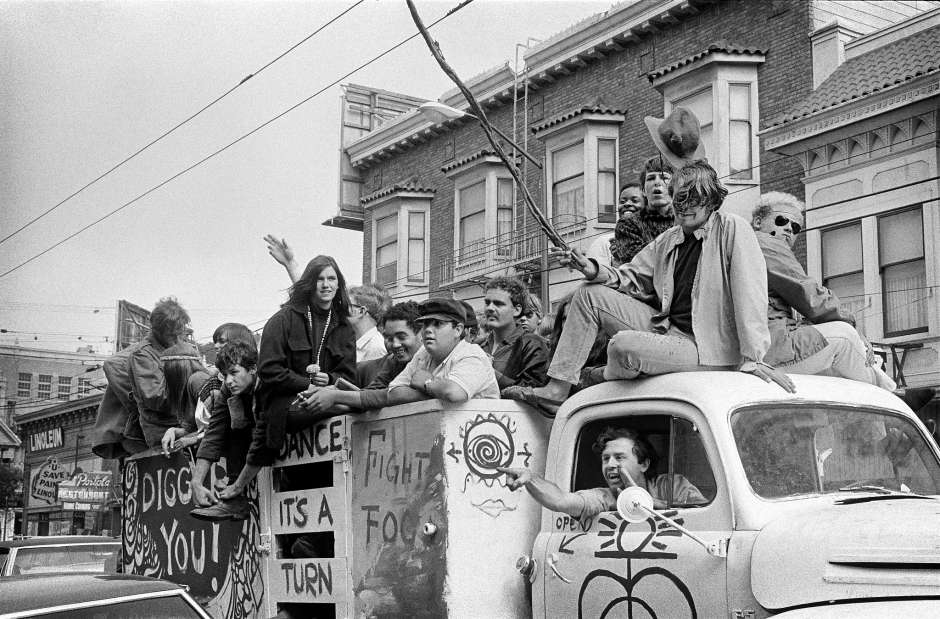
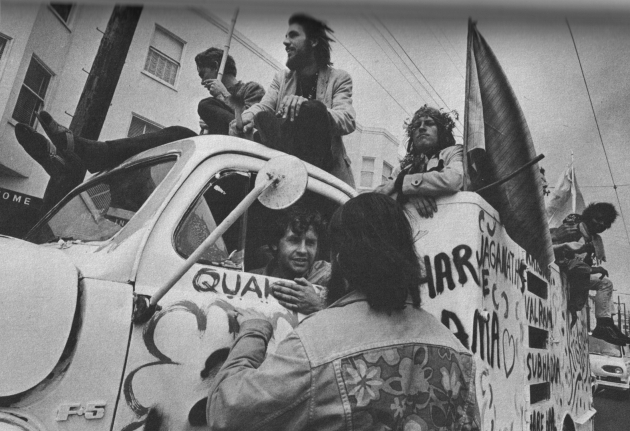
How well did you know Lenore and Bill Fritsch?
We’d go over and visit them in their place in North Beach. They had a North Beach apartment. They straddled the era between the hippies and the beatniks, so they knew a lot of the kind of older people. Like I was at that time in my early 20s, 23, 24, 25. And they were in their 30s, and they knew Brautigan and everything. These were all interesting people to us because they’d been kind of doing this for ten years before we’d even showed up. So it was always fun to go over there because she would have all those books from the City Lights bookstore on her shelf and she knew Ferlinghetti as a writer. She was one of them. She’d published the Love Book by that time so she was also, had achieved celebrity and notoriety as well with these kind of racy psychedelic poems. They were always very gracious. It was great to be there. They were almost, I don’t know, not the parent figures but something like that—they were the older, wiser people.
That day at the free store when someone had said, ‘Here’s a free car’? The old Studebaker Lark. I got it and we drove it that night over to visit Bill and Lenore at their place in North Beach. We sat around smoking dope and talking for a while. It got to be late, so Nina [Blasenheim] said, Eh let’s go home. So we said we’re going home. At that time, the intersections were not regulated like they are today. A lot of intersections in North Beach had no stop signs either way. So we were going through an intersection and we ran into the side of this poor old man’s pickup truck, with the Studebaker. Basically totaled it. I talked to the guy and everything and I was going to stay there and make sure he was okay and let the cops come and whatever. I didn’t know what was going to happen but I was gonna stay there. Nina went into a liquor store and called Bill and Lenore.
After about 15 minutes — I think somebody had called the police and everything but you know, the police take years to come — so we were standing around there with this guy and the side bed of the pickup truck had been stove in and the front end of the Studebaker was all crumpled up, water running out of it. And Billy came, walking up the street. He said, Hey man, you guys okay? Huh, yeah. We’re fine. He looked at the situation and he said, So what cha doing? Ah, well we’re just waiting for the police to come. He said, Uh I wouldn’t do that, actually. [laughs] I said, Really? He said No man, you see the situation, a free car and all that shit? You gotta walk away. I said, But the guy’s truck is wrecked. He said Yeah man but you can’t do anything about that. Just walk away. Let’s go, c’mon. So I just fetched a breath and we walked back to his house and they drove us home and we never saw the free car again. We did just walk away from that, and leave that poor guy with his wrecked truck.
You were saying the Diggers were always moving stuff around.
Yeah. Well, the food was one thing. But then we were starting to go out to the country too. This is probably a story from later on, in the ‘67 part. Brooks was living on Webster Street in the Filmore in a corner storefront that he rented. It was common in the SF area to have a storefront where the doors would not open on one street or the other, but onto the corner. That’s the way his place was. So he had a little bed in back. The hookers in the Filmore would come down and chat with him at night if there was a lull in business. He had some job working for a guy who had a chain of toy stores, five-and-dime-type stores around town. And the guy had entrusted Brooks with a big Avis rent-a-truck with a electric liftgate on the back.
So, the thing about everybody moving to the country was, they needed to BUILD. We were in touch with people up at Lou Gottlieb’s Morningstar Ranch, and there was a guy there that to this day I really admire, a guy named Calvino Filipas. He must have been about 60 at the time, but he was hanging out with us. He was an old Italian anarchist who would hand you a book by [Errico] Malatesta or one of these guys, full of anarchist principles, and say, Read that! It’s about just what you guys are doing!
He was up there, and he was talking to Lou Gottlieb and the people who lived on this place, all of whom were just looped on acid all the time. He was talking to them about … He’d say, The thing you need to do is organic farming. And to do organic farming, you must prepare the soil. So they’d go dig for mussels in Tomales Bay, and bring back the mussels and eat them, and then they had these shells. So he was out there, he would have sledgehammers, and we would stand on a concrete pad and we’d CRUSH the shells and shovel the crushings into the compost pit. He was preparing the soil because, [he’s say] We’ve got to be self-sufficient, we can’t rely on the pigs to feed us! He actually had a solid rap. If you go to the farmer’s market today, that whole thing that Calvino was talking about then is now happening.
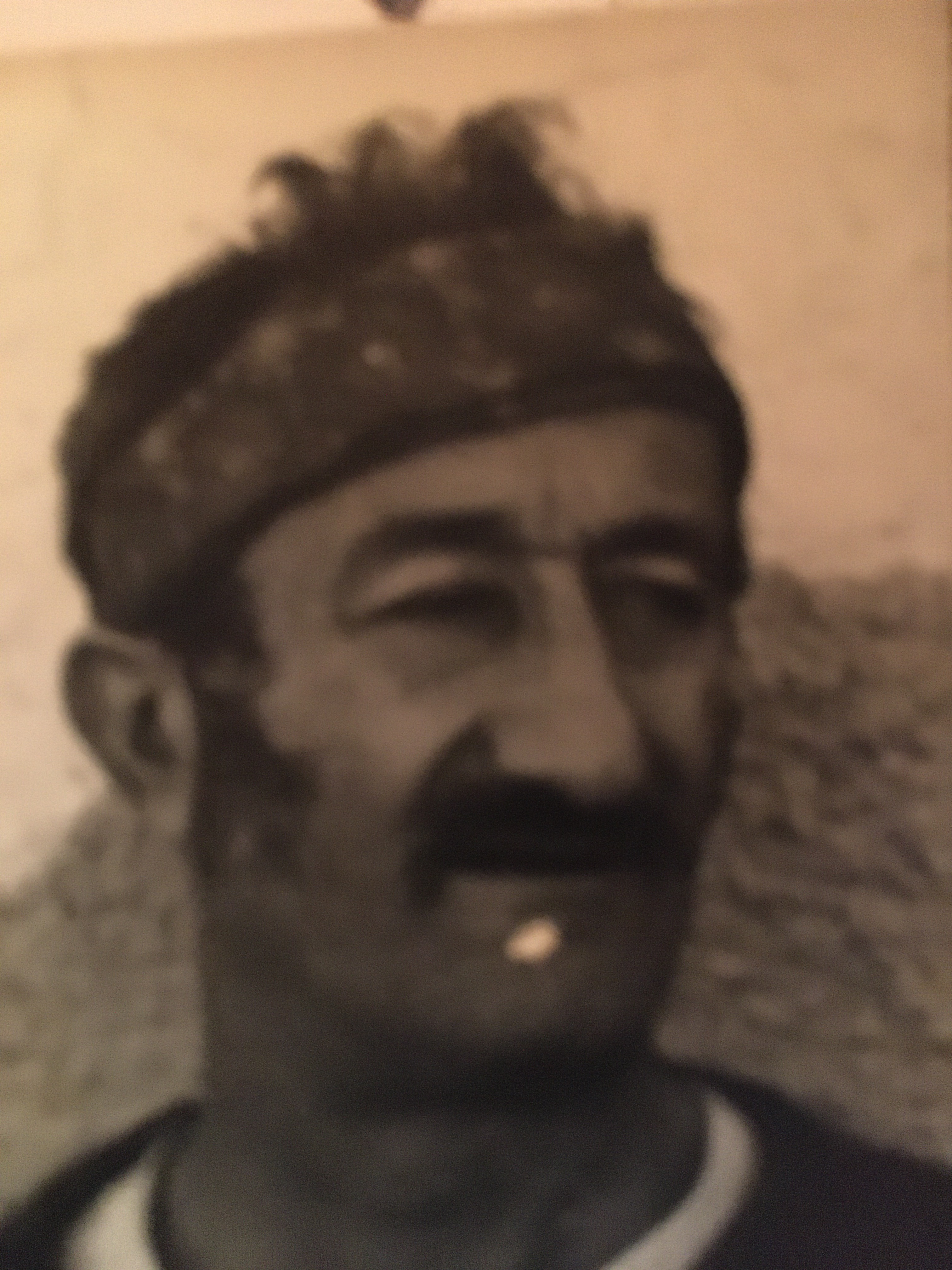
Above: A contemporary look at the Morningstar Commune.
So these people were living in tents and Calvino was talking about how they need to have lumber to build the basic structures to house these people. Calvino had this idea of building this movement. I don’t think he was quite aware that these people did not have mental or emotional resources to build shit…but we weren’t aware of that either! We were persuaded by his thing. So alright Calvino, we’ll get you the lumber. It’ll be here sometime next week. He went, Alright.
We went back. Brooks knew he was gonna get this big truck from his boss. So the plan was we would take my little truck, the Chevy pickup that I fixed with the reference book, and we would go out to Diamond Heights, where they were building this housing development. They were building a new suburb on this beautiful hill. It was all like corporate housing and stuff, so it wasn’t so much stealing stuff from individual people who were building their homes. So we loaded up on essentially plywood and 2 x 4s. We used the little truck. We didn’t take the big truck up there because we didn’t want to queer his relationship with the guy. The big rig truck could easily be traced, anyway.
Oh, you used the big truck to take the stuff to Morningstar.
That was the idea. We were loading up his storefront, and then eventually we would take a big load up to Morningstar. That was our plan. So, we’d go and boost some stuff from Diamond Heights, then we’d load it up in the store, then we’d go home. And then the next night we’d do a little more. And a little more. So four, five nights we did this. One night, the cops pulled right up in front of the place and they come in. They say, What’s going on here. I say Well we’re just loading in some lumber. Where’d it come from? It came from blah blah, and Brooks had some thing where Calvino’s son or somebody was supposed to say well we brought this from his uncle’s place over in the East Bay—he invented some story. The cop said, I see. Call him up. Alright! Get the phone. We call up Calvino, pass the phone to the cop. Ring ring ring. No answer. Cop says, Okay, well… If we hear that lumber is missing from somewhere we know where to come. Oh yeah, okay, well…we’ll be here! They leave.
So. Um. I’m not telling the story right because this happened in two parts. I think it was like the next night, or two nights later, and we’re loading the lumber ON to the huge truck. Now the cops pull up and their headlights are shining in the door. And they come in. And I think this is where they asked us to call, where we ended up calling. So we were totally in suspense. We didn’t know if they knew that this lumber had been boosted from Diamond Heights. They could have been informed of that but evidently they weren’t. So this was a really close call.
But we did manage to get all the lumber, load it onto the truck, and then we got up in the morning and drove up to Morningstar Ranch, Sebastapol. I think it had been fairly wet weather so we drove it through this kind of mushy … And we said, Hi, where’s Calvino? Oh he’s not here. I see, well this lumber is part of the building for you guys’ houses. Groovy, man! Far out. Put it there, I don’t know, wherever. Far out! You know, people were walking around naked, tripping. And so, nobody even helped us unload it. But we unloaded all of this lumber, got rid of it, and then the goddamned truck was stuck in the mud! So we had to call a tow truck—and pay for it! To get the truck unstuck and get it back out of there. Nobody lifted a finger, they were just, they had no idea what was going on. Wherever Calvino had gone, we didn’t know. It was one of those things where it was like, WHAT THE FUCK are we doing? The risk we took to get what must’ve been thousands of dollars worth of lumber.
There were so many different episodes. This is just one. We would go out on runs with other people, with other trucks, and we preferred rainy, foggy nights, naturally. Nina would always be a little bit worried, you know, cuz we just had this lovely little boudoir there with our little bit of hashish in the pipe next to the bed—it was just so lovely. But then I’d go out at one o’clock in the morning. Imagine her feelings: maybe I wouldn’t come back or she’d get a call, I’M IN JAIL! By all rights, we should have been caught many times. Somehow, we just weren’t.
The pickup truck was really meant for light service. It was a half-ton pickup. But I was carrying around a lot of heavy shit in it, and it was too much for the springs, so I wanted overload springs. There was a guy named Don McCoy. Don McCoy was kind of a millionaire and his wife Paula had come from money. They were married but separated. Paula was a willowy beauty, stunning woman. Blonde and real lanky. Beautiful woman. I guess when they were separated Don set her up with a beautiful Victorian in the Haight. She was one of those well-born girls that liked to hang out with hairy guys like us. Romance and adventure, artistic and political something, who knows. Don, her husband, I guess he’d married money with her, but he’d also taken something and made something of it, because he had a houseboat-building business in Sausalito. He was part of the Sausalito houseboat renaissance, and so he made a chunk off of that. And then in ’67 or ’68 or something like that, he got hit with the free vision and everything and rejected the capitalist lifestyle but he had a whole bunch of money.
One of the things he did, he gave us his Shell credit card. This was not a hot card. This was a real credit card. And I went to this Shell station, run by these two black guys, I think it was like at Masonic in the Panhandle. Don McCoy’s fortune paid to have those put overload springs put on. He’d given us the card, and we passed it around. We put gas on it. I said, This is just for gas, right? And people said, he didn’t specify anything like that. So later on there was a huge contention between Paula’s parents and Don, because essentially Don was giving away the fortune that they felt that the children were entitled to ultimately so they sued him and I don’t know what the fuck happened. But his fate was not happy because he had this place called Olompali Ranch, and we would go up there and have nude baking parties and shit. People would be fucking in the woods, baking Digger bread to take back down to All Saints, and Don owned this very luxurious place, but ultimately I think one of the kids drowned in the swimming pool. His fate was not happy.
To be rich, to be rich on that level, and then to get SEIZED with the vision, like what do you do? It must be very difficult. I think that he and other members of the family must have suffered for that. Poverty can certainly fuck you up, I know people that have been fucked up by that, but wealth can also really do you. You can really get fucked up by money. Don McCoy’s tragedy is not necessarily part of your story, but he did spring for us in this extremely open-handed way, with no complaint.
Paula McCoy’s place was on the same block as where the Dead had a house. What was the relationship between the Diggers and the Grateful Dead?
A lot of these groups were around the neighborhood and if we had an event in the park frequently there was a rock band who was glad to play. I think many times they played for free. They were making money, they had concert tours and recording contracts and everything, and so as money started to move through the culture, rock n roll was really one of the legitimate ways it could start moving. The other way of course was drugs, which was not legitimate. Those were the two kinds of people who had big concentrations of money: rock bands, drug dealers.
Did you know [LSD manufacturer and Grateful Dead associate] Owsley?
Not really. As a Digger, I was the guy in charge of operations. People like Billy and Emmett and Coyote, they would come down here to Hollywood, they would talk to movie stars, people like that. I didn’t really get into that. I was Pierre La Truck—I fixed things. I did a lot of the moving and hauling and physical work, and things like that. I never met Owsley.
And I didn’t really have a close rapport with the rock groups either. I started noticing that I didn’t like the social environment that was created by rock n roll. It tended to be frantic and egoistic. I remember once when we doing the free food… You know, it had to rotate, so nobody had the burden of doing it all the time. It was like you got a call—We’d like to use your apartment for the free food. So somebody’s apartment would be devastated for a day because there’d be this shit all over the kitchen. The stove would be fired up, the kitchen would be unbearably hot, the women would be in there sweating away.
Anyway, at one point, I was living with Peter [Berg] and Judy [Goldhaft], right across from the free store on Cole and Carl, and I remember there was a point where we didn’t do the free food in the park anymore, we just distributed it as groceries. People were coming to the front of the house to get the groceries. A case of tomatoes would be put on the sidewalk, a case of artichokes, a case of carrots. So they’re just there in boxes and people would come and get stuff and that was the free food. The truck pulled up, the food was put out there, people were elbowing each other out of the way and it started to be this feeding frenzy. I thought, that’s not it! Don’t do that. That’s not a way to distribute the free food. Something’s sick and wrong here about this. And I remember I said, Try music. And I went up and put my stereo in the window, right above it. And I put on these Italian trumpet concertos—again it was something stately and measured and dignified—and I said like, listen to that. And I played the music. And pretty soon people started going After you. No go ahead, that’s okay. Oh there’s only one left? You have it. People started to behave like that because the music tended to create a different reality.
I remember watching that magnificent documentary Gimme Shelter. Gimme Shelter has Diggers in it, y’know. I remember seeing a picture of Billy Fristch in it. Because Billy started working with the Angels. He became an Angel. And, that concert was set up by Emmett. When you watch the movie, it’s like what’s being expressed in the music and the performance is an angry, cocky, egotistical projection. I remember watching it and people start shoving and pushing each other in the audience and Mick Jagger’s going, What’s the matter, people? Hey why can’t you be loving and groovy? Then he’d go back to the kind of thing he did in his performance, which is cocky and angry and confrontational. And so the qualities of the performance were being reflected in the activities of the audience. Coming out of the stuff we had done where we were Diggers, where we were basically arranging theater events, I mean that seemed so abundantly clear.

I remember one event on Haight Street, and this involved the Grateful Dead, I think. We had set up a street fair. Maybe it was a year after we had cleared all that traffic off the street. There was a street fair. And again Arthur Lisch had his colored chalk. We were setting up things. I was walking up and down the street. There was a string quartet playing music, and then there was somebody else playing one of those bamboo flutes, and here was a person selling these extremely imaginative color candles. So there’s all these hippie artists. People were selling clothing, artifacts, sandals, wall hangings, art and posters and things like that. And everybody was wandering around and it was this wonderful environment, where you could smell the pot and the incense, and it was filled with love, and it was the best kind of Haight-Ashbury event that you could imagine.
And then I looked up and right by the Straight Theater, this big U-Haul truck backed across the street. It was filled with these enormous amplifiers. And the Grateful Dead were on the truck. And as soon as the truck was in place… CHONG! This giant chord resounded down the street. And everybody stopped what they were doing and sat down and they watched. And so all of that interaction just stopped, and they were watching one hugely amped activity. And the music was very nice, the Grateful Dead were terrific musicians, but really the life of the place just stopped with that. And I thought, Eh I think I’ll go home. Cuz it was suddenly an event for people who were fans. And what had been going on before was an event for participants.
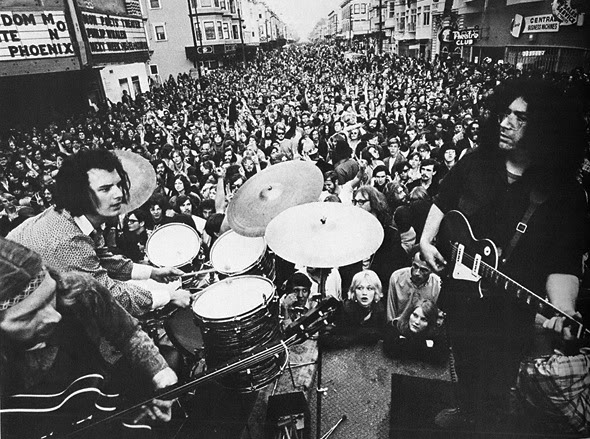
[thinking back to earlier in the conversation] Pardon me though, because I did come to Hollywood once with Coyote, but this was much earlier. Coyote had been a member of the Diggers for like a week or a few days when there was a guy in Hollywood called Zev Putterman who was a friend of Peter’s dad, or who at least knew Peter’s dad, and he produced a show, called the Les Crane show, which was a talk show. And Les Crane had this idea of putting on a guy called Bart Lytton. Bart Lytton ran a company called Lytton Savings and Loan. Litton was a colorful, articulate, handsome, silver-haired capitalist representing the Establishment. And Les Crane knew that Peter was this articulate guy, or maybe Peter had appeared on TV or y’know, he was an actor and doing the Mime Troupe stuff and all that. So, he wanted to get Peter down to L.A. on one of these debate things with the Les Crane show, with Peter Cohon versus Bart Lytton. But Peter has only been in the Diggers for a fuckin’ week! So Coyote said Kent, you gotta come with me on this, I’ll get you on the show. So we came down and were admitted into a studio. I remember walking in with Peter, and this guy Zev Putterman ‘Hey Peter, howyadoin? Hows your dad? Great to see you” and Zev was there and it was almost like he was saying So if you want to work in Hollywood, we can find you an agent and stuff. I was totally being pared off. People who were to the manor born were admitted and I was being asked to read a magazine. Peter wanted me to be with him on the show. And he told them, Listen, Kent knows so much about this, and the guy said, You know, we can’t. The lighting has already been set up. Sorry. So I was left to heckle from the audience. But it was a brilliant idea, because Peter was actually FAN-TASTIC at that kind of thing. And much better than I would have been, really. He has an unbelievable gift for that. He invented things during the conversation like “the equal-opportunity shaft,” stuff like that. Burt Lytton was giving all this liberal stuff about how organizations like his, they were the real things that were bringing people out of poverty and building the American dream, and the hippies were really a misguided… ‘not that I have anything against you personally, I’m sure you’re nice people but let’s face it…’ He would have to give the Establishment argument like that. Peter was fantastic, he totally threw a loop around his arguments and tripped them up and showed where the Establishment was actually creating poverty, the War was shifting money away from… He totally had the guy, he was running circles around him. It was a great show, it was very interesting. Questioning the very way that money works, to divide people into classes and stuff like that. He was terrific, just fantastic.
And we went to see the L. A. Diggers, they were a little bit different. They had none of the criminal glamour of our group. They were very much well meaning people who wanted to give food to poor people and ‘help.’ They were very nice.
What do you know about Altamont?
Emmett was really interested in doing that because Woodstock had happened, y’know? Woodstock had happened back east. The idea for Altamont was that we would have a Woodstock for ourselves here on the West Coast. I’m not close to the event. I wasn’t there. So I don’t really know what happened. But I think it’s really part of the whole story of Haight-Ashbury. It’s a story with a beginning middle and an end. It’s a story with an arc to it, because at the end of 1968, if you stood and you looked down Haight Street you saw Beirut. Plywood boarded up all the windows. It was a smashed and wrecked place.
And if you looked at it before late ‘67 or early ‘68, you saw a place that was bustling with life. People moving through it—It was really a river, because it was a river that was going somewhere else. People that came to the Haight were ultimately on their way to another thing. Y’know, it’s the old story, you look at the letters of the young kids that came through at that time, and in my early 20s, I was already one of the older guys, cuz it was a place really where a lot of teenagers came through, they would write home to their parents: I’ve met these really beautiful people. And those beautiful people would go somewhere else, and do something. And that was what it was really about.
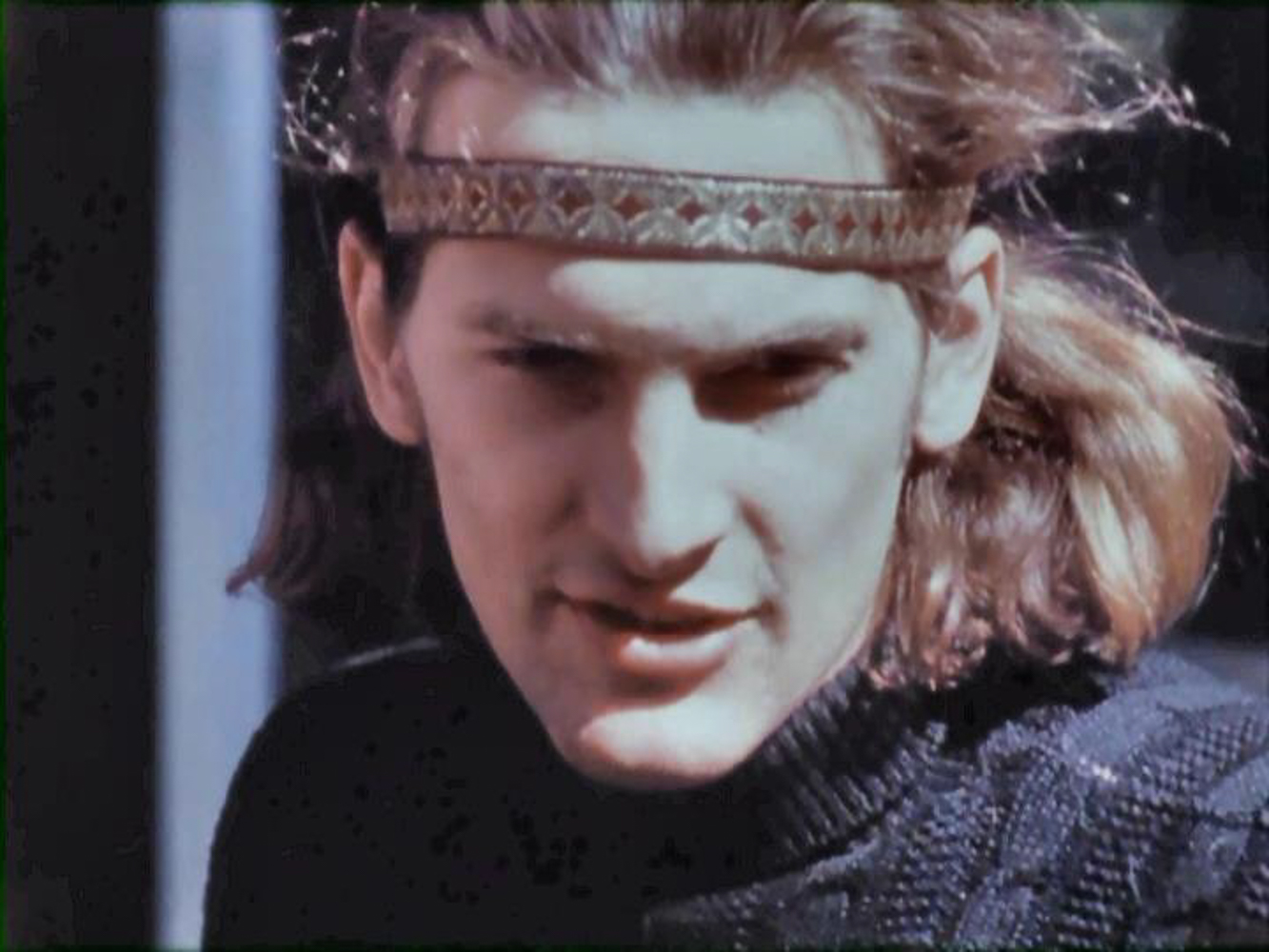
There was another event I remember, at Winterland. We were starting to see these guys—big burly muscular guys, they all wore white turtleneck sweaters and sportcoats and they had cars with phones in them. We thought of them as the Mafia. I don’t know what they were but they were walking around, riding around, and right at that time, Superspade was killed, and we had other people that we knew who were drug dealers and they had to get out of the city.
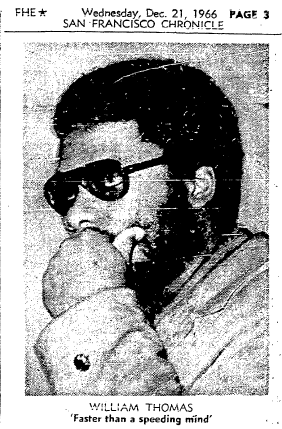
I remember someone said, Get Kent, he’s always got a truck. I had to drive somebody out of town because they were in fear for their lives. So what had happened was that the drug traffic which had been this free-form thing was being taken over by organized crime. The sources of money were being grabbed, and controlled, by various people who were interested in those things. And people who were gonna stand in the way were gonna lose their lives. That’s what happened to the Haight-Ashbury. I think the story of Altamont is part of that story. I can’t tell you any details because I wasn’t there. The best I can do is try and put it into context. That’s what was happening in late ‘68 and early ‘69.
What exhausted itself was the hippie thing in the Haight-Ashbury. The Digger thing did not exhaust itself. Leaving town to have babies was a fresh lease of life for it. You might actually say it brought a real stability and power to what we were doing. We really didn’t call it the Diggers anymore, we called it Free Family, but it was the same thing, really. “Diggers” was an urban, quasi-criminal thing that was really about short-term theatrical effect. I mean, you could say we started the free medical clinic in the Haight-Ashbury and stuff like that, but really, that was David Smith, he was really the one that gave it staying power. We created theater that could have the potential for that but we didn’t have any of the skills necessary to really make a free medical clinic stay there for years. But when we moved to the country and started having kids, then it was different because people started talking about buying land. Black Bear. [David] Simpson’s place, Nina and Freeman [House]’s place up in Petrolia—those are examples.
What happened to Brooks?
Brooks seemed to me to be the most emotionally healthy guy—he was completely spontaneous, he was totally in touch with his body, he was adventurous, kind, resourceful. He wasn’t a big intellectual but he respected intellectualism, would read a few books like James Joyce and shit, just to keep up his end of the conversation. He had real intelligence and a great, great personal energy.
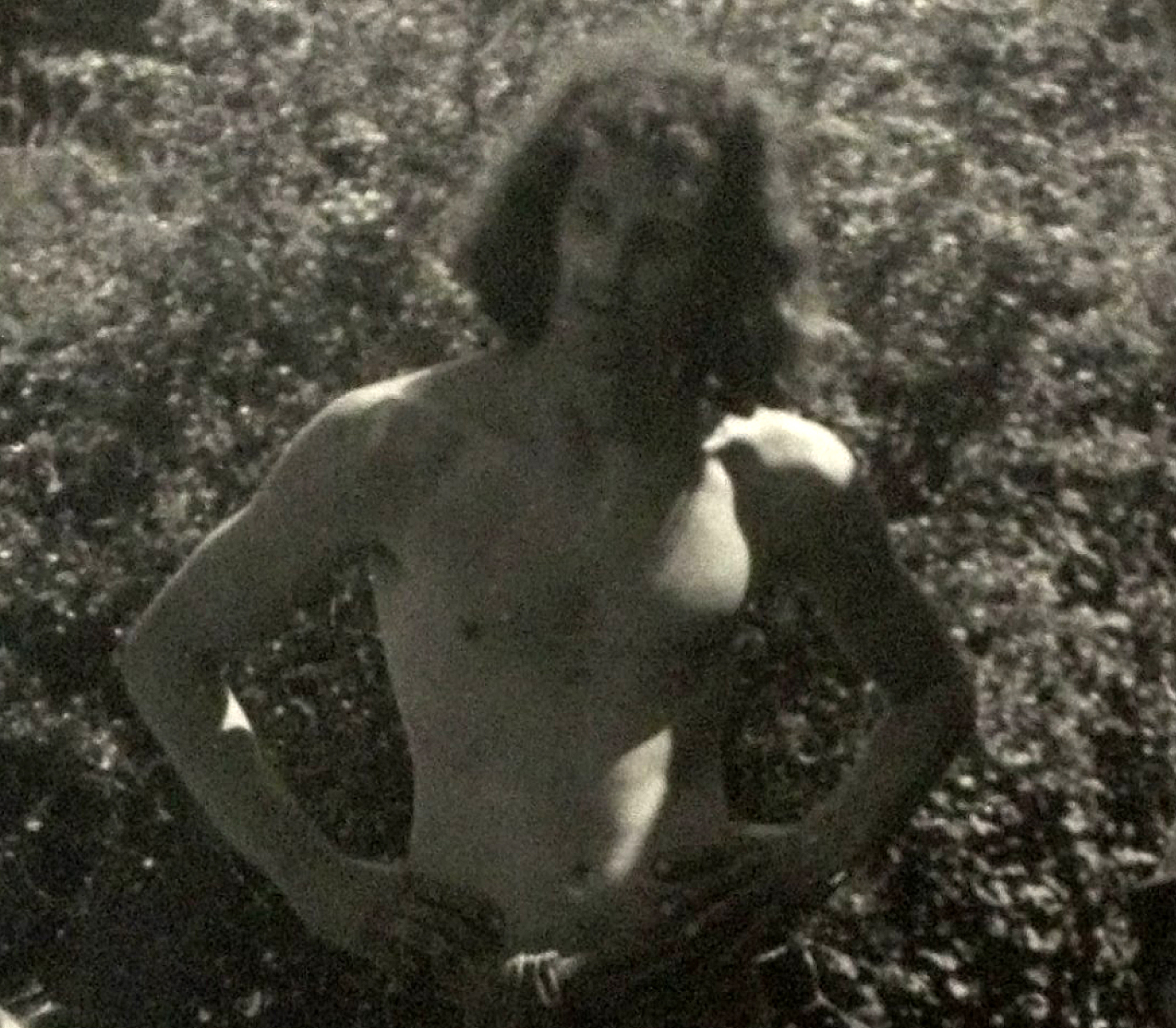
But as the time we had together went on, he would start to do things with drugs that were in fact a little odd. And then our lives went in different directions. I went on the road with the Minstrel Show and in ’68 I came back and then… In 1969, Nina and I were looking for the place to have the baby. We wanted to find Brooks because Brooks was kind of part of it for us. But Brooks had gone off, and we hadn’t seen him for a year or something. I heard that he’d been seen running naked on the highway up in Marin County around Bolinas. He was in Bolinas a lot. People in Bolinas knew him. Somebody said he was up in Mount Shasta. And I went there and found him, walking along the road with a 60-pound square honey tin on his shoulder. He said he was living with some other woman somewhere in a lean-to on the mountain. He had just gone totally out into the woods, to live in the woods. That was the last I saw Brooks for about 10 years.
So somewhere around ’79, I was living in San Francisco. I was working for the city, I had a job working for the arts commission, and also, I was starting to act in plays around town, and I got a telephone call from Brooks. I told him my address and said meet me there later on, because I had to do something with work. When I came back home, he was sitting on my front stoop. And he was emaciated. He looked like a concentration camp survivor and he had a big scar on his forehead and his glasses were like coke bottle bottom glasses. He had obviously injured his face in some way. Mentally he was absolutely shattered. He needed money. I had a very low income job but I did have money, so I helped him out. He tried to tell me stories of what had happened. He’d been in Canada, he’d been with some kind of commune, maybe Moonies or something like that, he had been with some very religious people and some adventure where he’d hopped a freight and been thrown off the train and hurt himself. I got the impression also that he had had drug experiences of some kind.
So I helped him out, and he was in and out of my life for two or three years there, around ’78-79-80. He would go to a psychiatric place down on Army Street — I remember talking to his doctor — he would take lithium. I would tell the doctor, Brooks says stuff like Rockefeller has a bank account with a million dollars for him. And he said, Don’t humor him in that—if you think it’s bullshit, you should go, Brooks, that’s bullshit. Okay, thanks, that’s good advice. I would start doing that and Brooks would correct his story, say Ah I was just joking. But he was constantly veering off into outrageous delusions.
He was crazy in what seemed to me at the time the best sense of the word. He was completely impervious to social conditioning. Later on I got news that he’d gone back to upstate New York, where he’d come from originally, and where his mother still lived, in Painted Post. The final word I got was that he’d escaped from a mental institution in upstate New York. It was cold weather when he escaped. And that he had drowned in a lake in the middle of the night.
It’s such a sad fucking story. The thing that Brooks and I both liked and were interested in, and I must confess I still like it today, it was glorious adventure. Romance and adventure. That’s what we wanted to do. We wanted to do really interesting, far-out things and get laid. And, y’know, have interesting relationships with the women that we got laid with. The Diggers and the Mime Troupe were interesting, especially to Brooks, not for any reason of political ideology like you’d get from interviewing Berg or Coyote, but because it was really exciting and sexy and fun. Now of course those things were interesting to those guys, too. Those were the kind of things that we were pursuing at the Noe House. We had various relationships with women. I remember there was one woman we both wanted to fuck, and I remember we were there, we were talking about who’s gonna take her up to their room, because both of our rooms were on the second floor, and I remember we both turned to her and said, Well how about it? What do you think? And she was totally intimidated by that, just by the frankness of it: Well, you decide. We’re obviously at an impasse, neither of us are gonna give up, so what do you wanna do?
She ran screaming from the building.
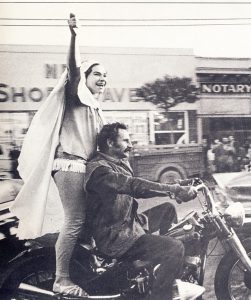


Another excellent piece. It’s such a pleasure remembering the gracious, debonair and handsome Kent Minault. How fortunate we all were to have such friends as he.
LikeLike
Excellent!
LikeLike
Great piece, but like what’s up with the Mime Troupe all in blackface?
LikeLike
https://www.diggers.org/guerrilla_theater.htm
Michael William Doyle [First published in Imagine Nation: The American Counterculture of the 1960s and ’70s, New York: Routledge, 2002] writes:
“And so by mid-decade, as the civil rights, free speech, and antiwar movements ripened into the Movement, [R.G.] Davis was leading the Mime Troupe into the van of New Left activism. Together with Landau and Serrano, they originated the idea for what would become known as the Mime Troupe’s most controversial play from that era: A Minstrel Show, or Civil Rights in a Cracker Barrel, a production quite unlike other irreverently political revues of the day. It was to political theater what Lenny Bruce was to stand-up comedy, an exercise in wringing the rude truth from the day’s news, while straddling the fine line between mere “bad taste” and the flagrantly lewd. Alternately subtitled Jim Crow a Go-Go, the show consisted of a series of skits performed by a racially integrated cast, all but the white, straight-man “Interlocuter” in blackface. The self-designated “darkies” were costumed in blue and ivory satin suits, white cotton gloves, and topped off with short-haired wigs like jet-black scouring pads. Audiences found it perplexingly difficult to discern the true racial identity of the six masqued performers, a predicament which rendered the actors’ raucous banter all the more unsettling. Mime Troupe veteran Peter Coyote attributes the show’s critical success to its offering “a rare cultural epiphany perfectly in synch with the historical moment.” The Minstrel Show had appeared at a time, he surmises, “when the civil rights movement and the emerging black consciousness fused with a social upheaval in the nation’s youth to make society appear suddenly permeable and open to both self-investigation and change.”(14)
Davis hoped to hone the radical edge of this production by means of form as well as content. To this end he solicited members of the local civil rights activist community to audition for parts, conjecturing that if he could locate several men who possessed both a progressive political sensibility and a measure of native talent, they would be able to polish their acting skills in rehearsal. Experience in civil rights advocacy, he maintained, would be indispensable to carrying out the task Davis and his collaborators had set out for the show: exposing the deep-seated nature of prejudice in contemporary society. The American minstrel show format would be redeployed in a way that subverted the racist stereotypes that had permeated the traditional traveling mode of entertainment. It would parallel what the Mime Troupe had done with commedia—adapt a popular theatrical form to explore a series of wide-ranging, contentious topics, in this case selected from more than a century of American racial discourse.
No subject was to be considered off-limits: interracial sexual relationships, myths of African-American male potency, and class conflicts within the black community were each dramatized and critiqued. The ghettoization of the past as represented by “Nego History Month” [sic] was lampooned without mercy (Crispus Attacks, the first African American to die in the Revolutionary War, gets shot by Redcoats while pushing a broom). In another skit, the irony of black soldiers killing “yellow men” in Vietnam by orders of a white imperialist command is put across with the austere didacticism of Bertolt Brecht. Institutional racism, naive integrationism, police brutality, craven Uncle Toms, supercilious white liberals, and arrogant black militants—all received their jocund due. In order to ensure that the play’s satirical barbs hit their many intended targets, staff members of the local SNCC and CORE organizations were invited along with the cast to critique the play while it was still in development.(15) The Minstrel Show attracted national attention for the Mime Troupe when they produced it on their first cross-country tour in 1966. Comedian and civil rights activist Dick Gregory sponsored its performance at Town Hall in New York, which garnered an enthusiastic review from no less than the New York Times.(16)
LikeLike
Fascinating. I’d heard intimations of the unfortunate fate of Brooks Bucher (Butcher?), but could never find any details. Until now. It would be nice to learn more of post-Diggers Brooks’ life. Thanks to both of you for the fine interview
LikeLike